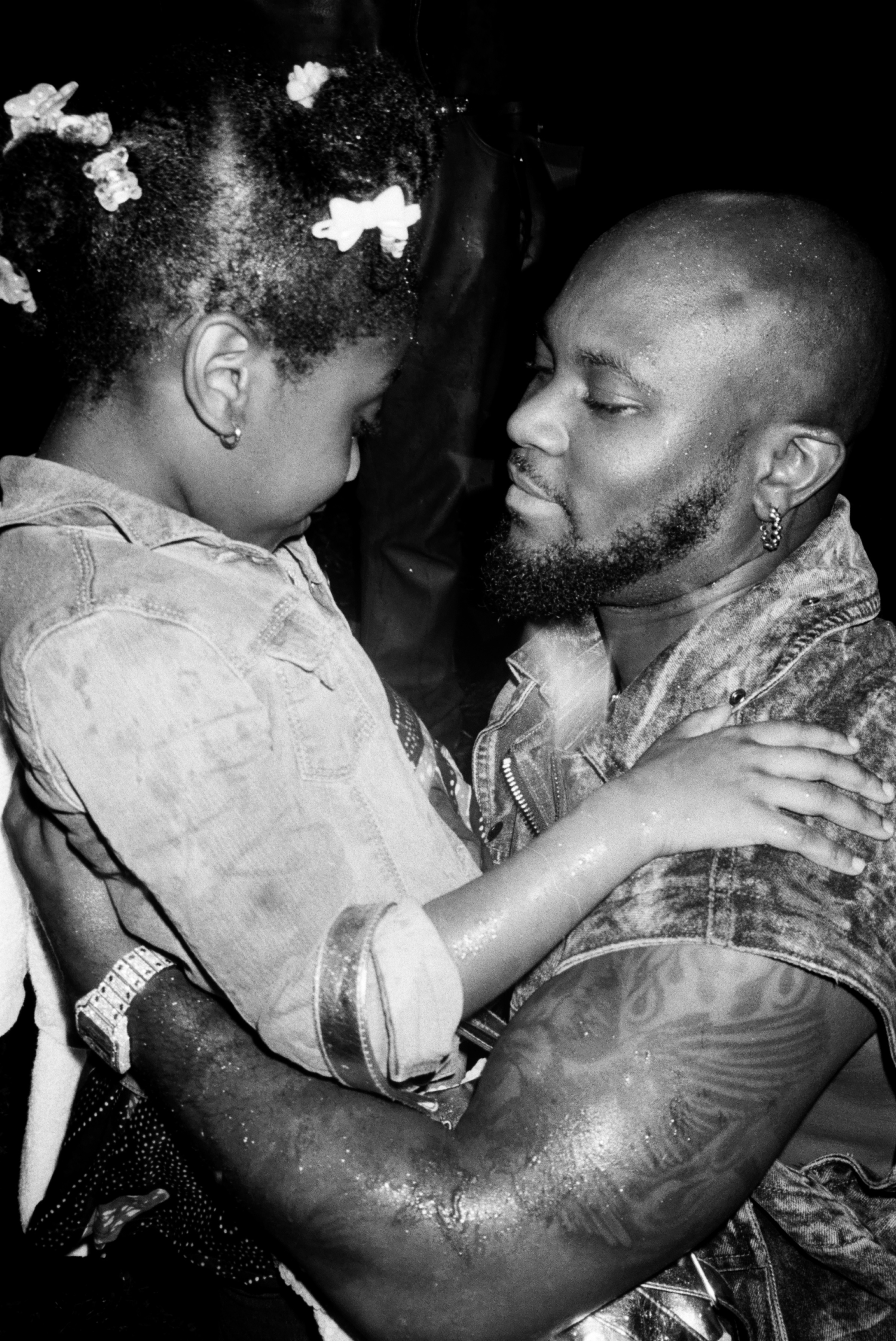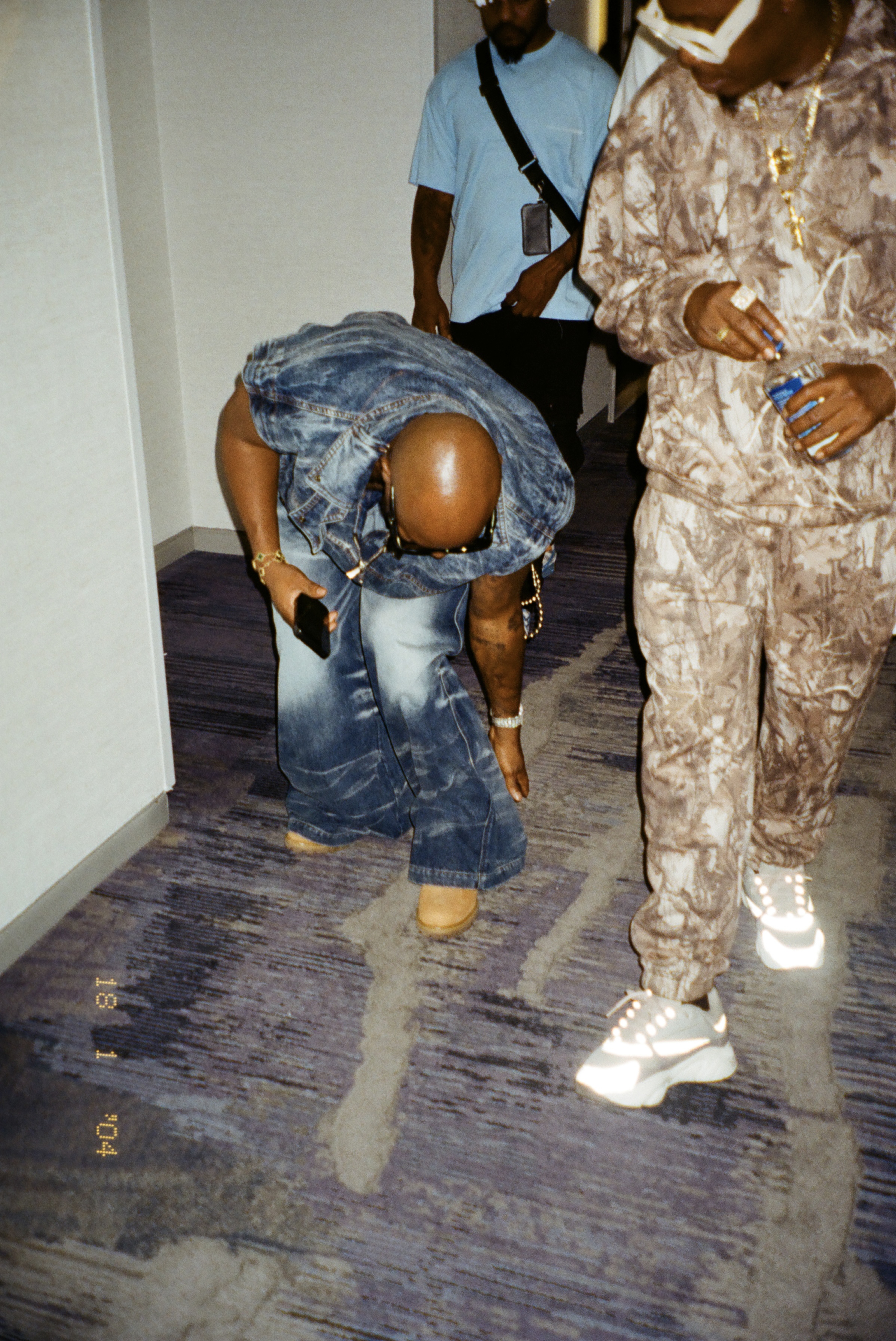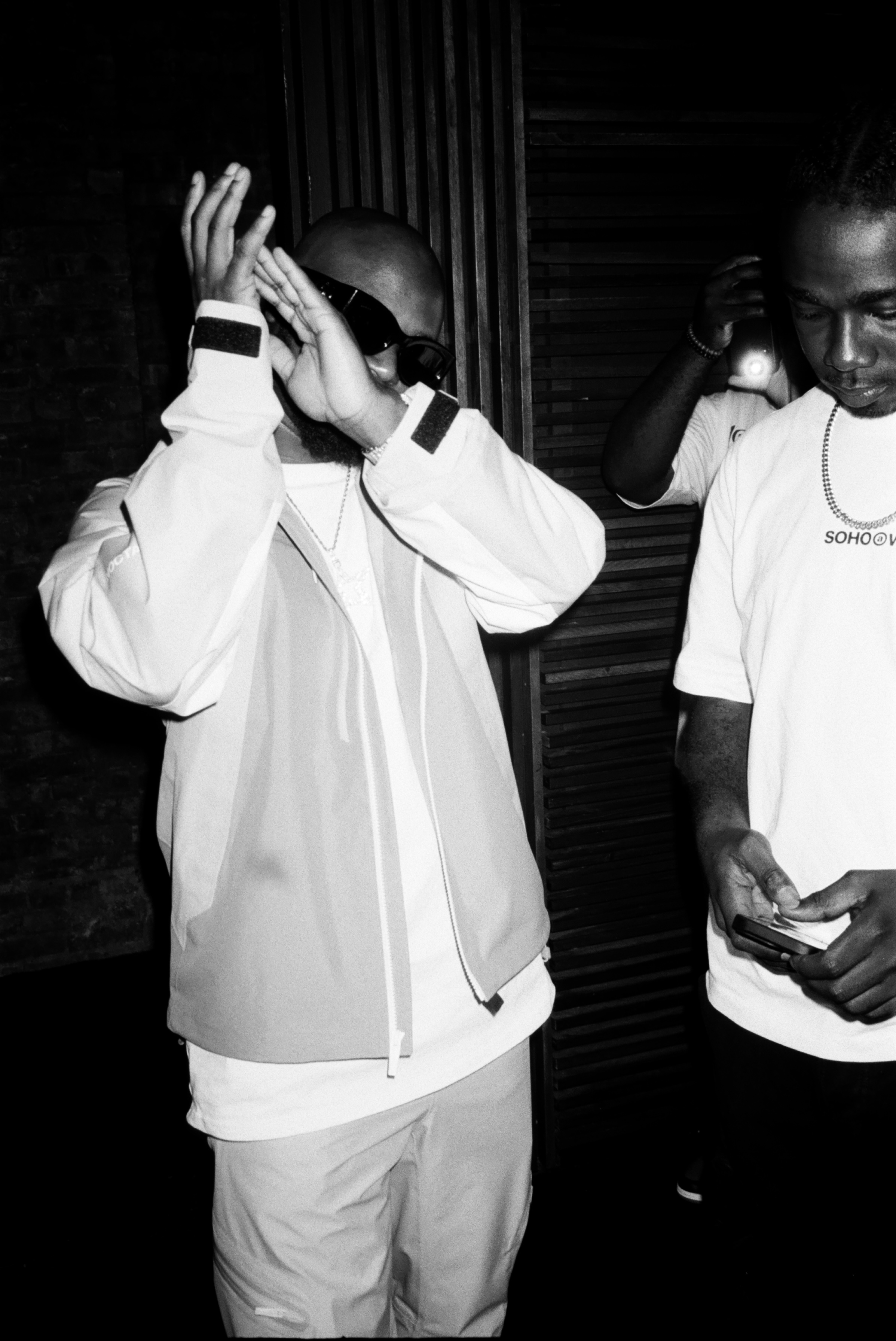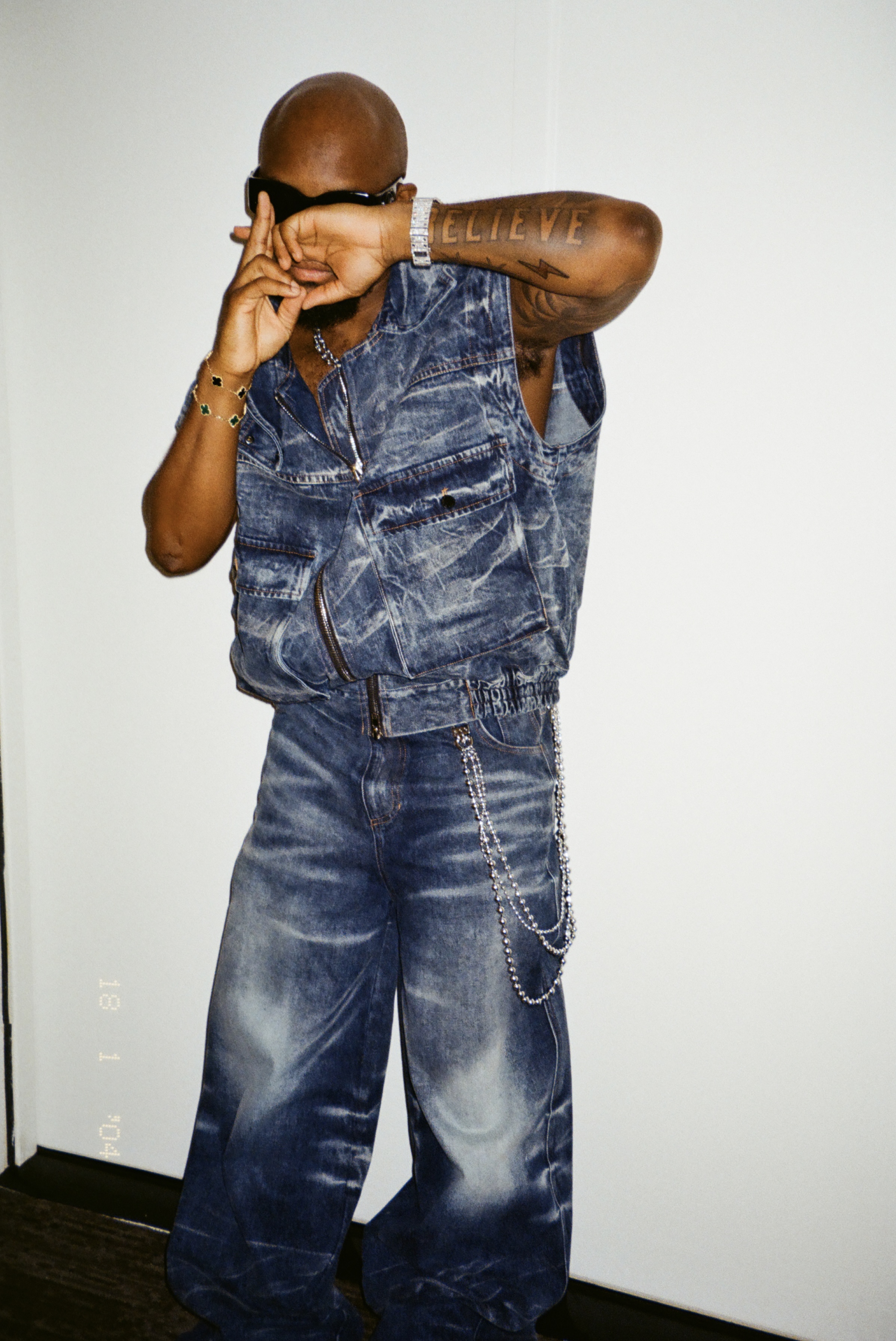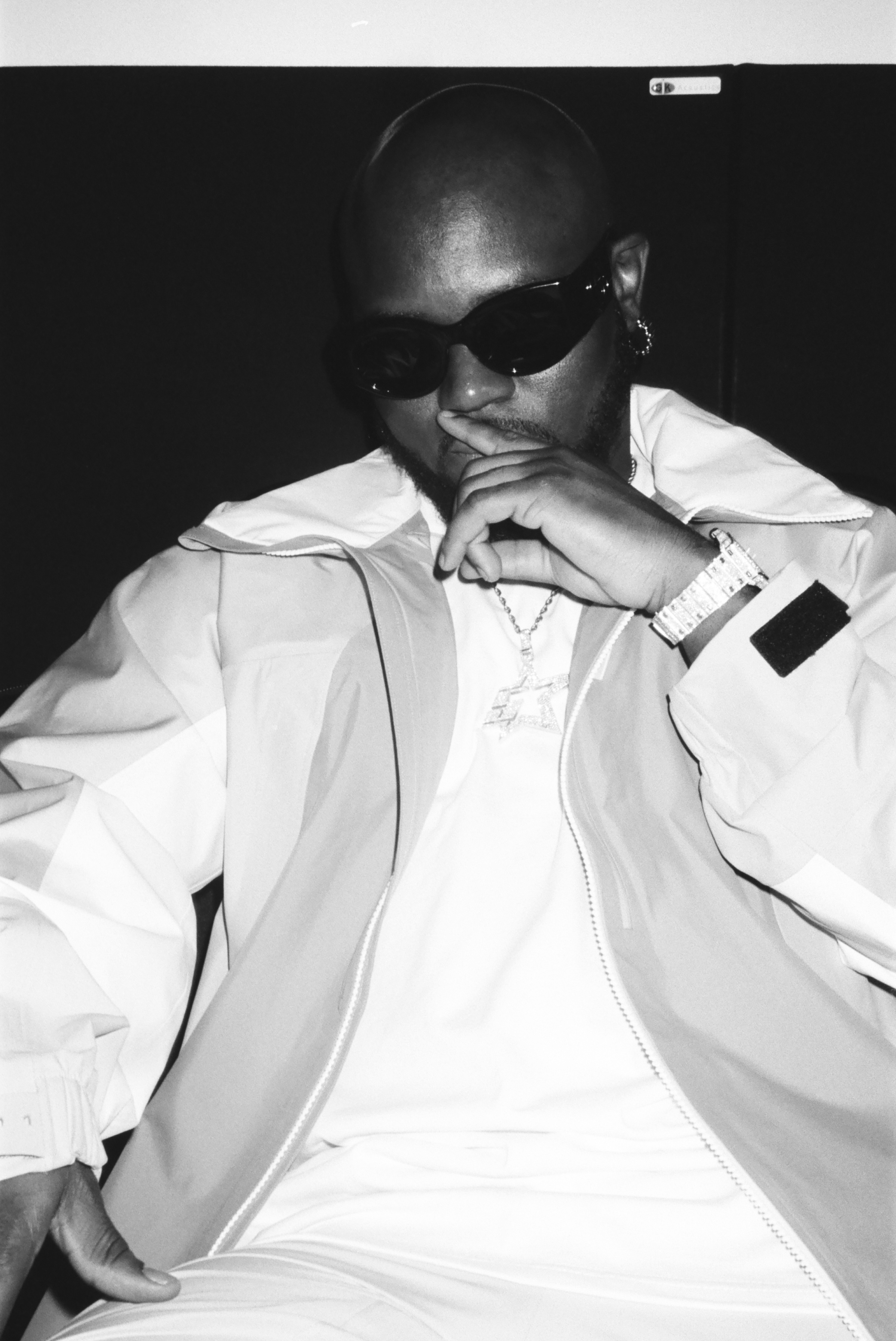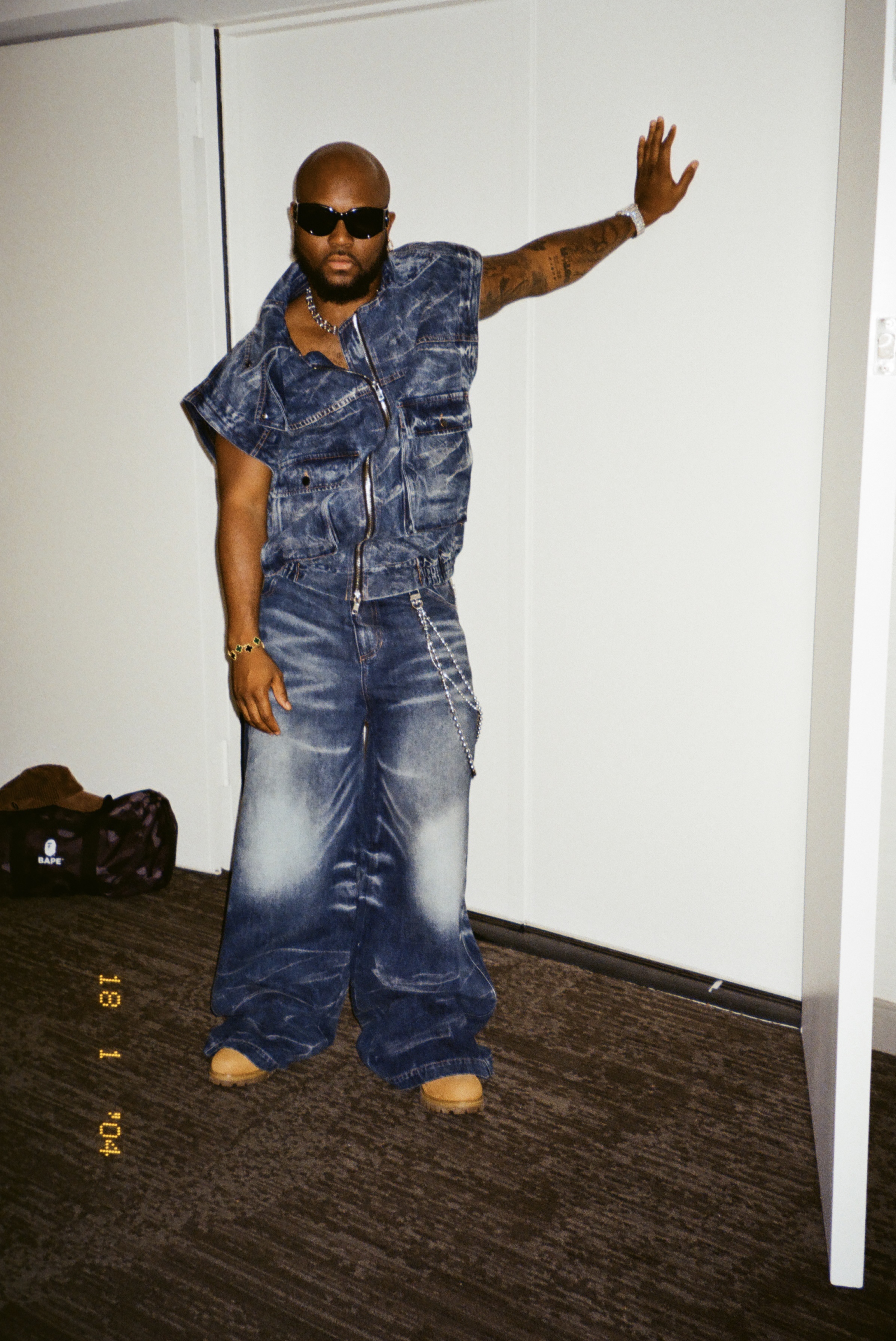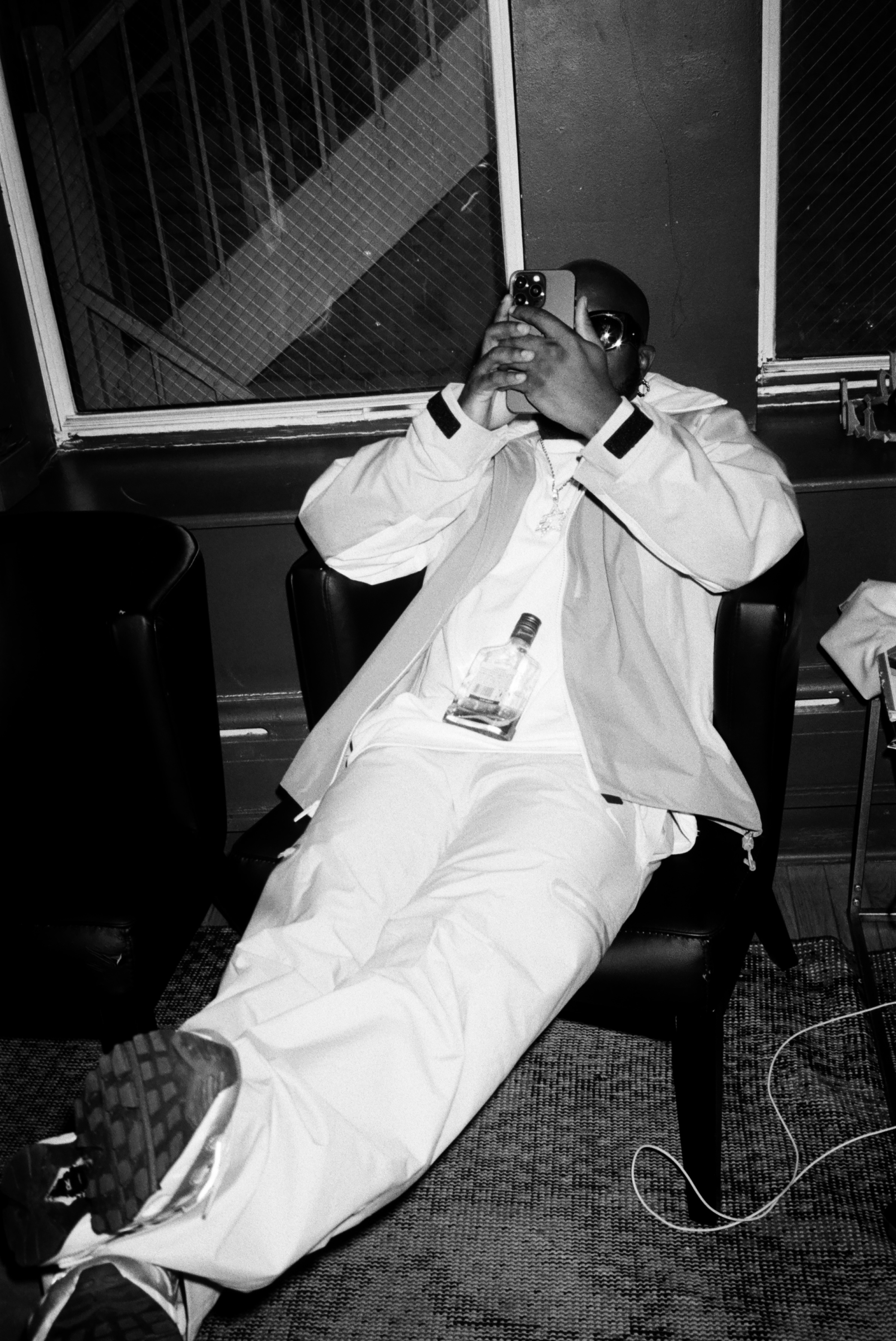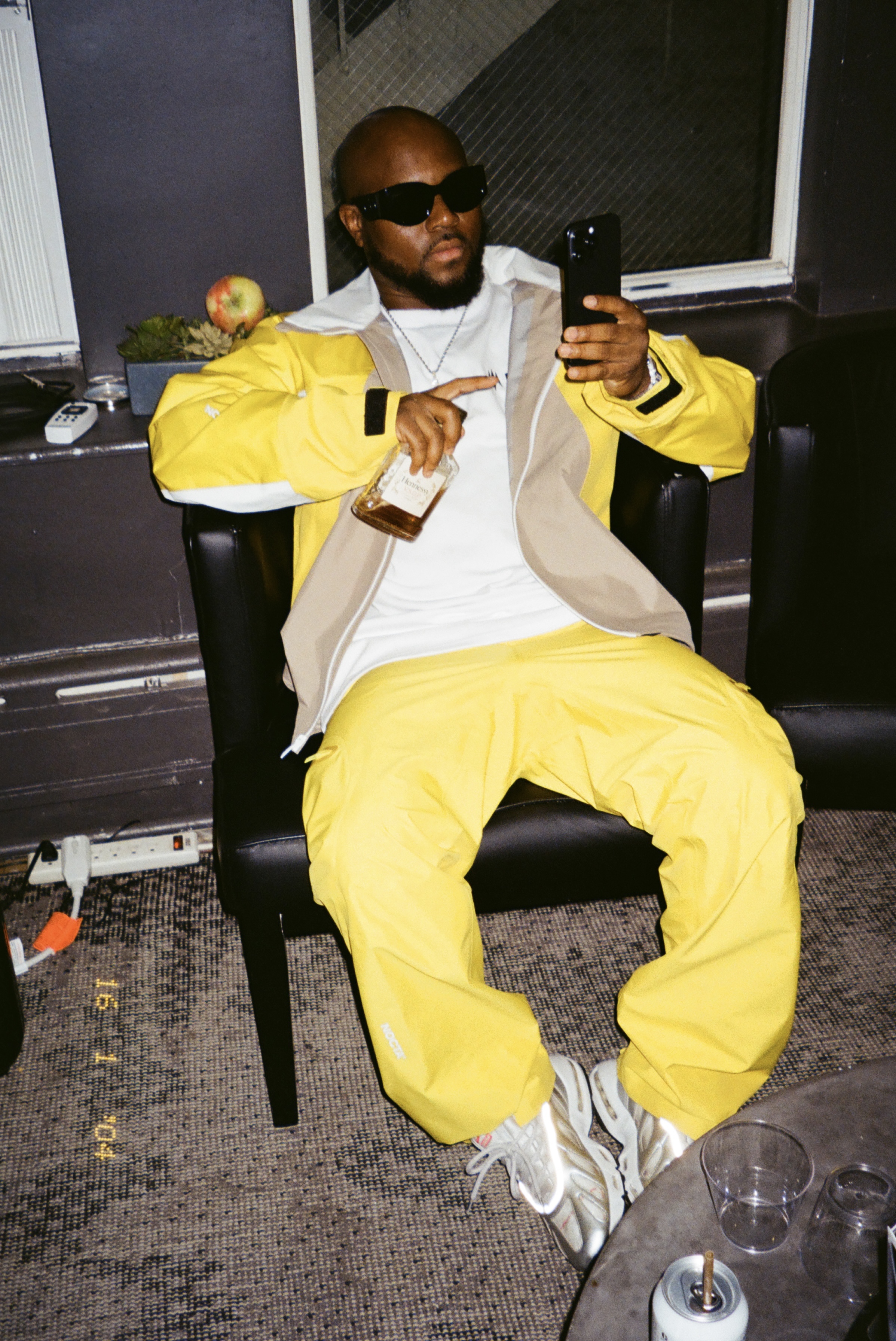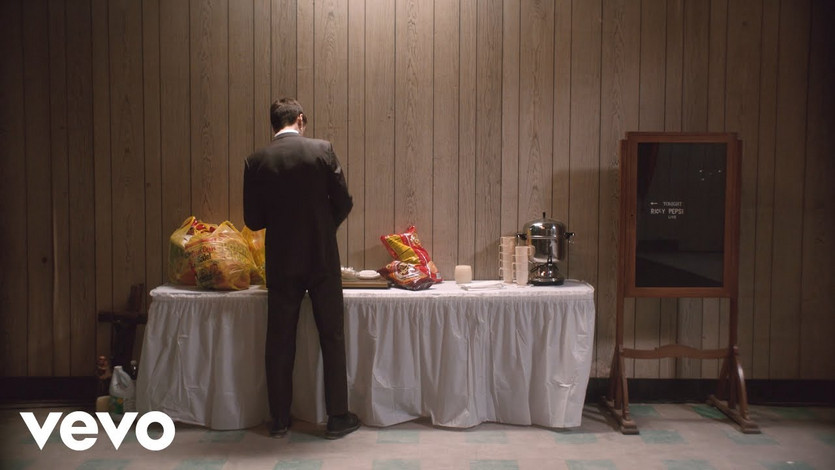Porches' Beautiful "Goodbye"
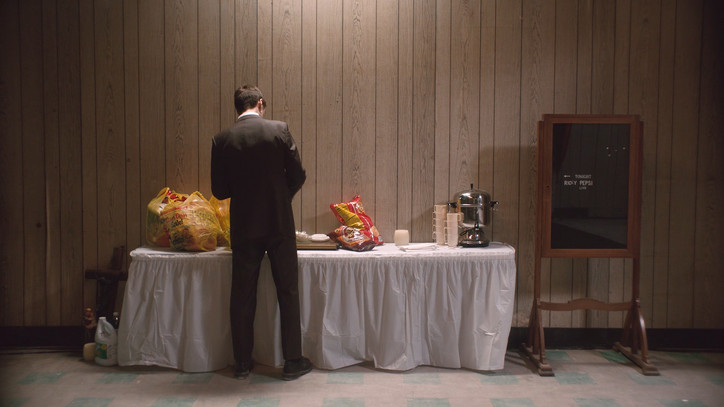
Porches is currently on a North American tour in support of his last album The House. Watch the video for "Goodbye" below.
Stay informed on our latest news!

Porches is currently on a North American tour in support of his last album The House. Watch the video for "Goodbye" below.
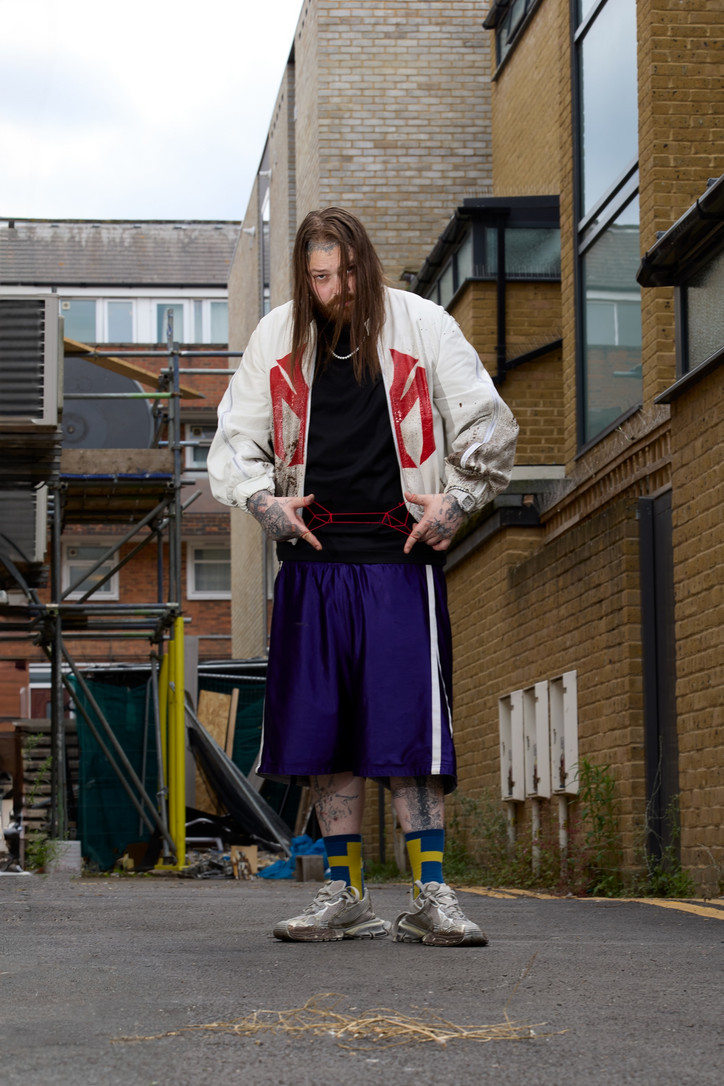
jacket MOWALOLA, t-shirt TALENT’S OWN, pants TALENT’S OWN, jewelry TALENT’S OWN, shoes BALENCIAGA
It’s been five minutes since our scheduled meeting was meant to start — five painstakingly valuable minutes — so I refresh my email for any updates. “Jonas says the link doesn’t work,” says his publicist in my inbox, so I make a new meeting and respond with another invite. Three more minutes pass. Another gut-wrenching response: “He says it still doesn’t work. Can you set up a Google Meet?” Fuck, I think to myself, We’re already off to a great start. I didn’t know how right I was.
Before I can even open a new tab in an attempt to salvage something — anything — from this potential meeting, an unknown caller barges into the vacant Zoom chat. The username “iPhone (5)” pops up onscreen, camera off, ushered in by the obnoxious clamor of bustling 808 drums compressed and distorted to hell. Once the camera is turned on, the music is paused; and there lies Varg2™ in the flesh. He gleefully chiefs the joint perched between his lips from under the hood of his black sweatshirt, clutching a pink Bratz Doll mug full of coffee. This is his morning routine. Even on first impression, I feel as though this sort of introduction makes perfect sense for him. His presence radiates a strangely familiar sense of camaraderie, effortlessly exuding the warmth of an old friend. Without hesitation, Varg2™ escorts me through the crux of his headspace, detailing his creative process, his affinity for trap music, and the path he’s taken towards self-actualization.
Olivier Lafontant— How are you?
Varg2™— I’m good, man. I’m good as fuck, I just woke up like an hour ago.
Where you at right now?
I’m in Sweden, it’s like 9 in the evening. I wake up in the nighttime. For me this is morning.
You’re waking and baking at 9 p.m., that’s kinda crazy.
I’ve been smoking since I opened my eyes, I need to smoke as soon as I wake up. Otherwise I don't feel right. But yeah, my days are kinda fucked up, I went to bed at 3 p.m. today.
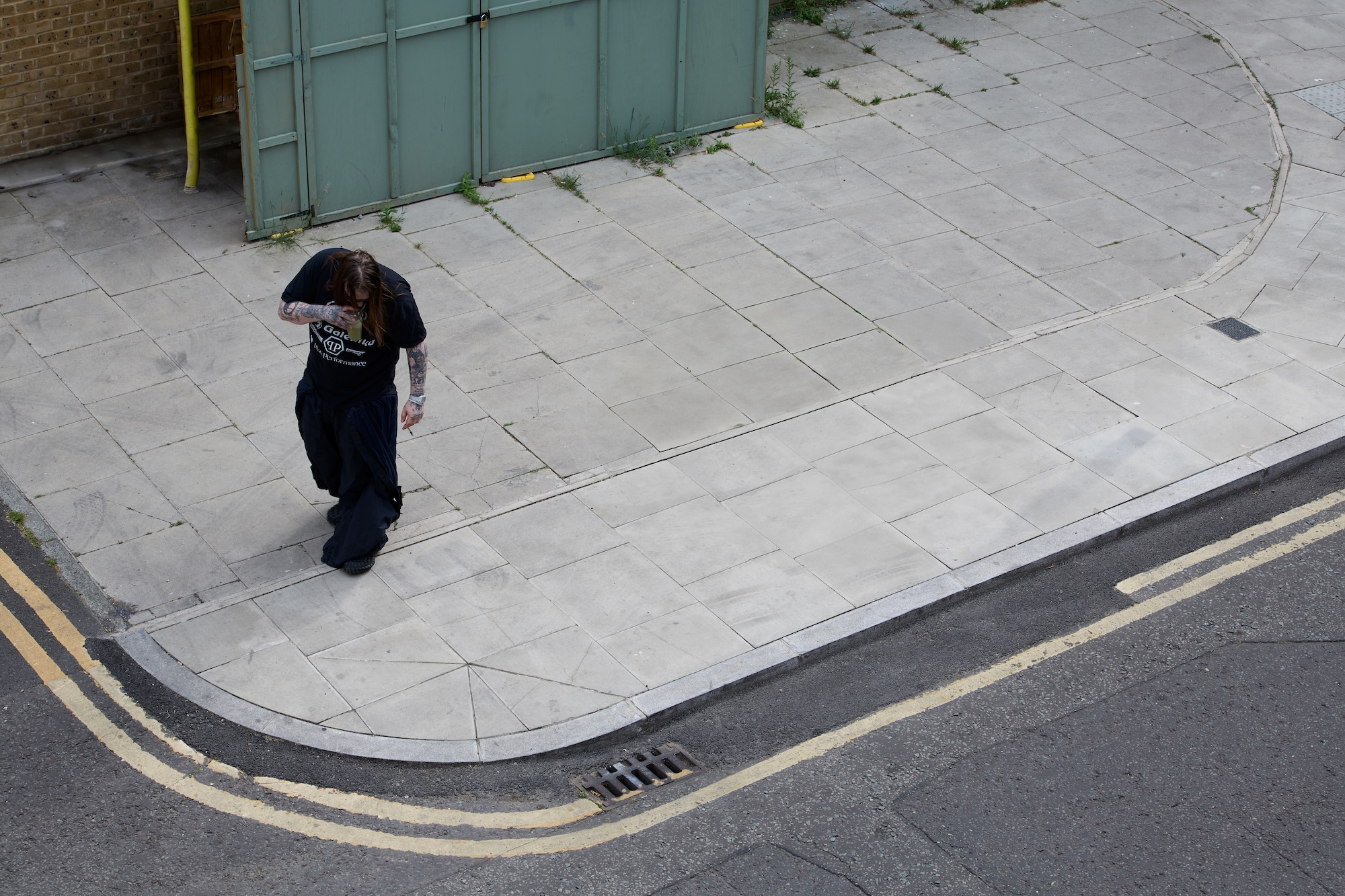
What have the past couple days looked like for you?
I’m not gonna lie bro, I’ve been out. It’s been good, me and my Swedish crew been out painting, making music, getting it done.
You still doing graffiti?
Every day.
What does that do for you? How do you process your life and your emotions through that?
To be honest, I think it’s the only thing that’s ever been consistent for me. It’s been my one true friend, it’s just always been there for me. It’s a lot of work that I don’t even put into my music. If I have struggles with my music or with some other shit I need to do, I’m just gonna be like “Oh fuck this shit,” and then paint. It’s just effortless love, unconditional love. It’s fucked up my life many times but it’s still the one that’s been there for me.
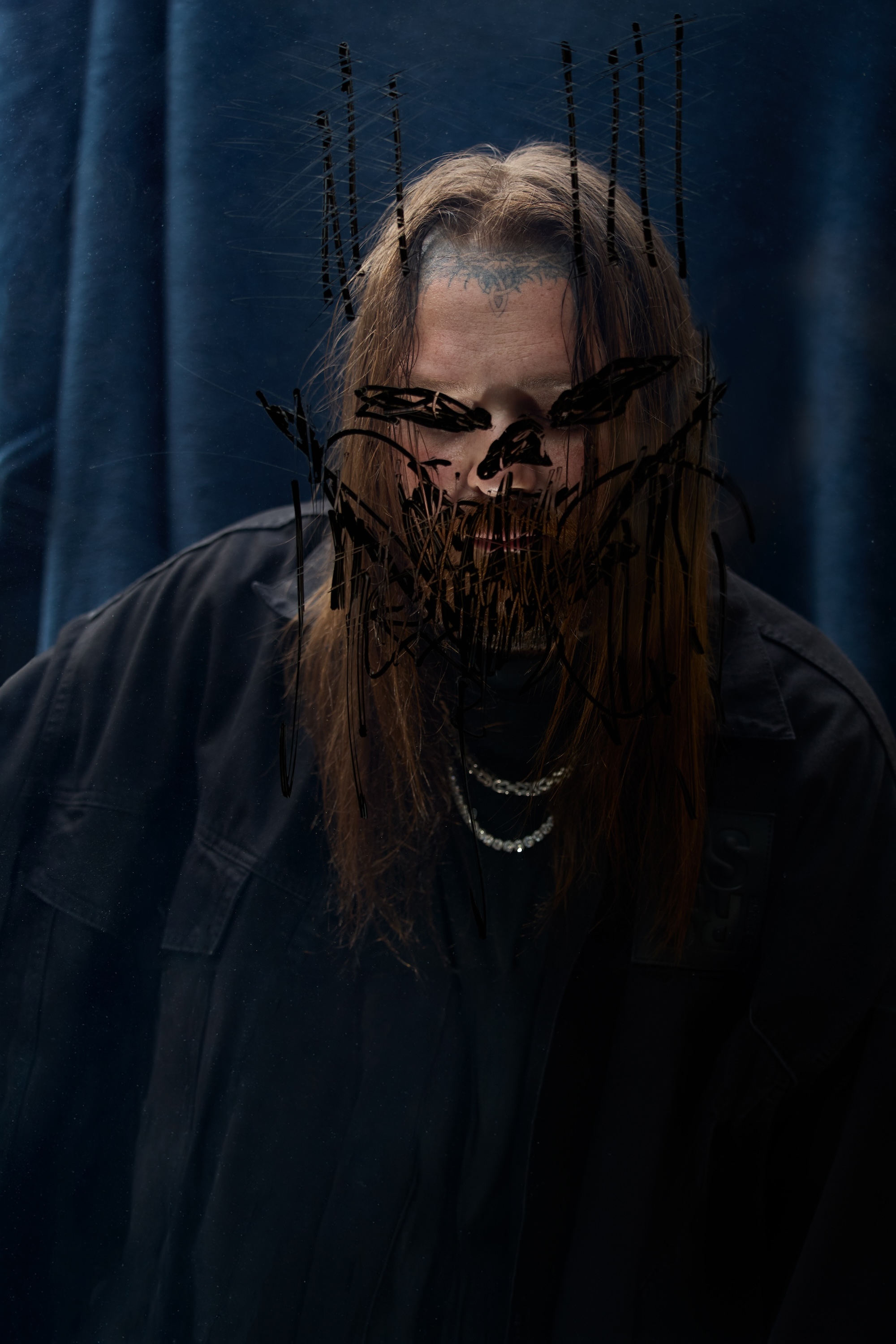
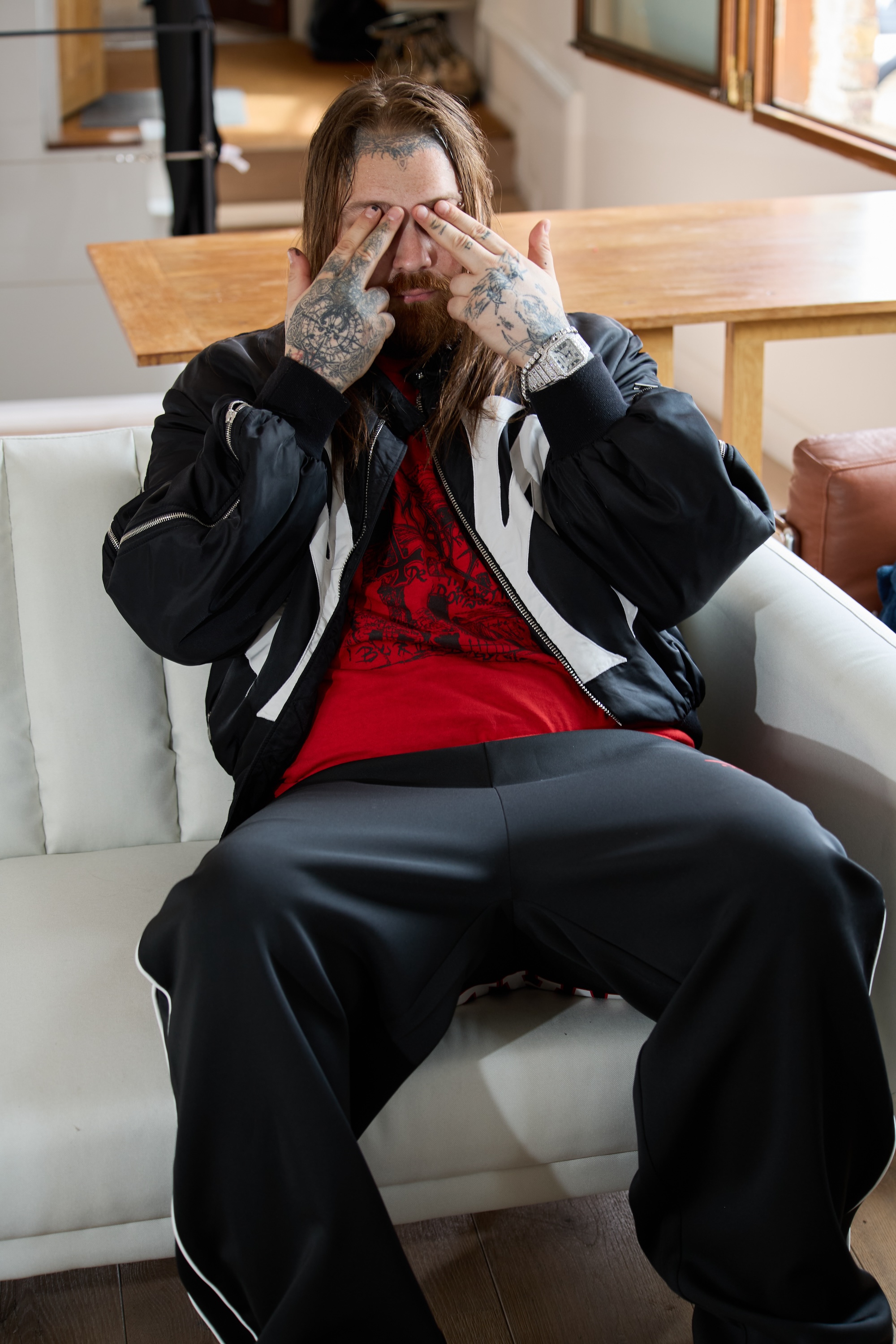
jacket RAF SIMONS from YANGBANG ARCHIVE, top ARTIST’S OWN
jacket MOWALOLA, t-shirt TALENT’S OWN, pants MOWALOLA
Something that’s stuck out to me about you is how you make very electronic, cinematic music, but you’re very influenced by artists like Shawny Bin Laden, Ballout, OLA Runt, a lot of American street rappers. How do you process those influences and make it so that you’re still putting out music that’s true to you?
I think why [someone] listens to Ballout, or trap in general, or black metal — it’s music by people who speak their own truth. My music is true to what I see. It’s not about translating [what I like to listen to], ‘cause I make ambient soundscapes and shit like that. I’m just translating my emotions. It’s the same with trap. You can have shit like Lazer Dim 700 that’s super low [sound] quality, the production of it doesn’t really matter; it comes down to how well you can tell your own story, type shit. I saw 21 Savage just bought a new G Wagon for his mom’s birthday, and in the photo she had a white Richard Mille on. I’m sure as fuck 21 Savage also bought that Richard Mille. That shit fire. I sat and I looked at that picture, and his mom looked so happy, bro. And it’s like "Yeah, materialistic love, she got a G Wagon, whatever, whatever,” but I’m sure that 21 Savage was an annoying piece of shit when he was a teenager — I bet he snuck out, I bet he had girls’ parents calling his house, [he was] selling drugs, shit like that.
That smile is not about the fact that she got a G Wagon, [it’s about] the fact that her shitty ass son who kept talking about robbing people into a microphone can actually afford to buy her one from doing that. That journey is fuckin’ genuine and honest and beautiful. And you can talk about the “value of the lyrics” and shit, but that’s the thing, this is just the truth. These are the real poets, man. An artist goes to a place where normal people don’t dare to go and they report back.
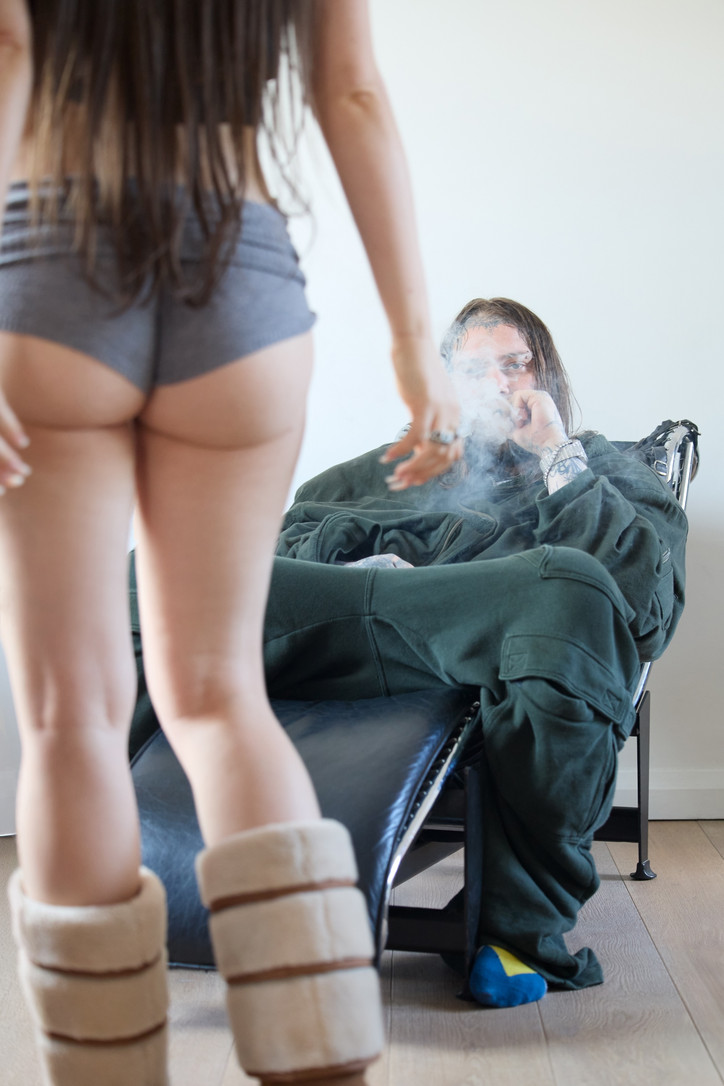
tracksuit GREG ROSS from LNCC
Now that you're six albums into the Nordic Flora series, what do you feel like you've learned, and what makes this album different from the rest of them? Not just sonically, but also in terms of the emotions and the process you have at this point in your career?
Not gonna lie, I stopped making music for a pretty long time. I kind of found my way back making this album. It wasn’t meant to be a Nordic Flora record from the beginning, it just became that. The main difference is I made half of [the Nordic Flora series] on an iPad inside of a car in motion, [and] at airports. One tape, I forgot to turn the iPad microphone off and you can hear German men in the Lufthansa Lounge in Munich fuckin’ complaining about the bratwurst being out and shit. It’s a very honest record series. I put out my first record in 2013 and since then my music career has been an open diary. This record was made in Sunset Sound Studios with Yves Rothman, my good friend, in Los Angeles, an iconic studio. The fact that within the same record series and without signing major, just by my own two hands, I’ve gone from making wonky tape experiments in the north of Sweden to playing the celesta the Beach Boys played — for me that’s legendary. Now there’s definitely not gonna be no more Nordic Flora, I feel like I’m a new person now. I already have three new albums coming out, I don’t give a fuck. I got so much music.
You’re really on your Gucci Mane shit now!
Me and Christ Dillinger dropping a massive project.
Something that you said that caught my attention was the fact that you feel like your music is such an open diary, but as a producer you're not putting your voice onto the songs. How do you feel like you're still getting a distinct message out through your sound or the features you choose?
When the feature's on there, they’re telling their story. If I make a track with you, I clearly felt something with you. I work with my friends, I work with people I look up to and admire, you know? I never do a feature for clout or payment, I don’t give a fuck about that shit. The features I have on my tracks [make] music I listen to, [they're] people I respect, and people [whose] universe I feel correlates with how I feel. For me it’s logical, maybe it’s not logical for the listener, but that’s not up to me. And also what you said about music without words — sometimes words are not necessary, bro. Like, for example, for some reason I always think about big boats sailing away, you know? And it doesn't even need to be about like a goodbye or something. It can be just a fucking cargo ship, but you see the lights at the horizon going away. That's a feeling I keep feeling. And I don't know what that feeling is, but I definitely know what it sounds like.
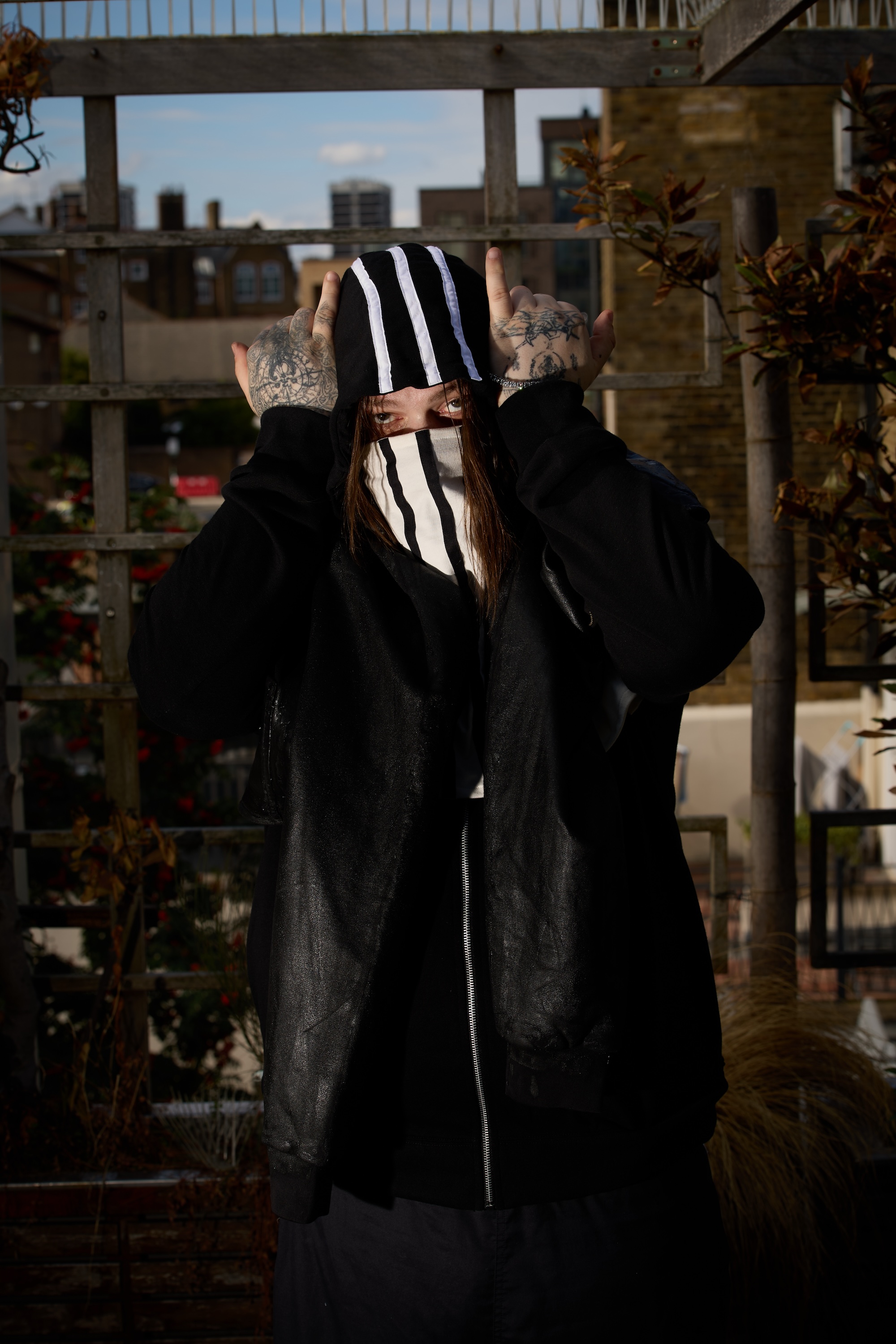
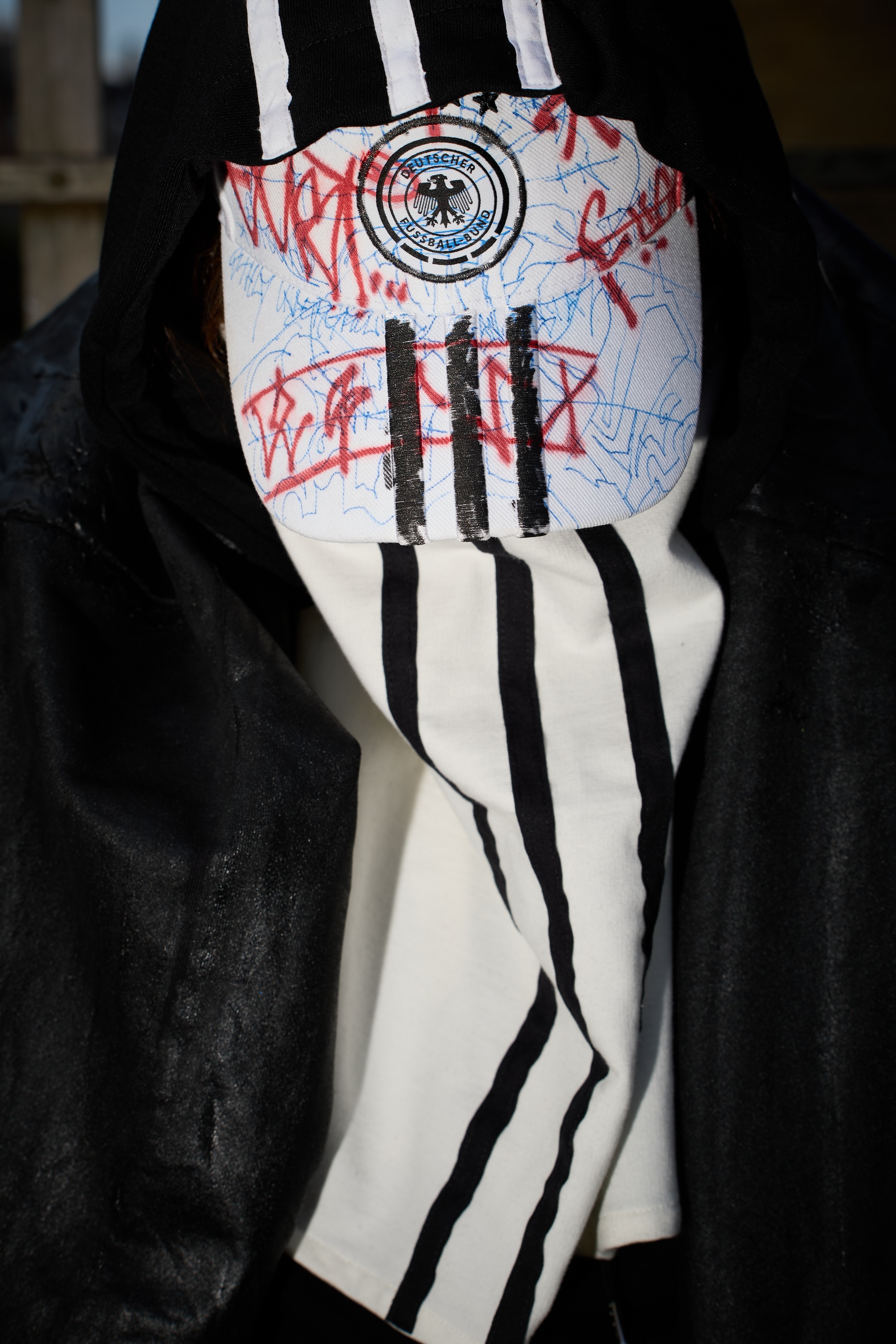
bomber PROTOTYPES, hoodie CUSTOM from NOTHATNEGATIVE, scarf CUSTOM from NOTHATNEGATIVE, hat ARTIST’S OWN
Last year you had the “Fucked For Life” art exhibition with Bladee in Manhattan, and you also recently opened your own gallery in Stockholm. Considering how this is a different medium for you to express yourself, do you see it as a bridge to connect to your music? Or do you have two separate worlds where your art is in one place and your music is another place?
A lot of people try to separate what they do, but bro I’m not trying to do any of that. I’m not that complex. I live in one place, I live in one world and it’s my world. I made my own spot and this is where I exist. What I paint is what I see. I just do what I feel, and for me it doesn’t matter if it’s painting, or graffiti, or cooking, or writing, or walking and looking, or making music. For me it’s all in the same universe. And yeah it can be hard. I lost a lot of friends, I lost a lot of partners. It’s tough to be with someone who lives in their own world. I don’t really compute with society. My therapist of a few years said the most lame ass shit — she told me that every day when I wake up, I should choose the path of happiness. And I was like, "Choose to walk the path of happiness, that sounds like something a fucking Christian person would do," you know? And I'm like, "I'm not Christian and I'm not walking the fucking road to happiness, you dumbfuck." But that doesn't mean that [it has to be] this “good boy Christian road." The road to happiness can just be waking up, you know? And as long as you don't hurt other people through taking that road, just take it.
You mentioned as part of your process, you take time out to write. What is it that you write and how do you feel like you process yourself in your writing?
For like a lot of my older records, there's a lot of poetry and texts and stuff. I wouldn't say that I write poetry, but I write down my thoughts. I write a lot. I can see at least 15 different stolen moleskin pads laying on the ground here filled with notes. I just write down what I feel and like I said, I don't see a difference with that and painting or music because also when I sit making music, I go through and read my texts and I'm like, “Oh, I remember feeling that shit or thinking that shit.”
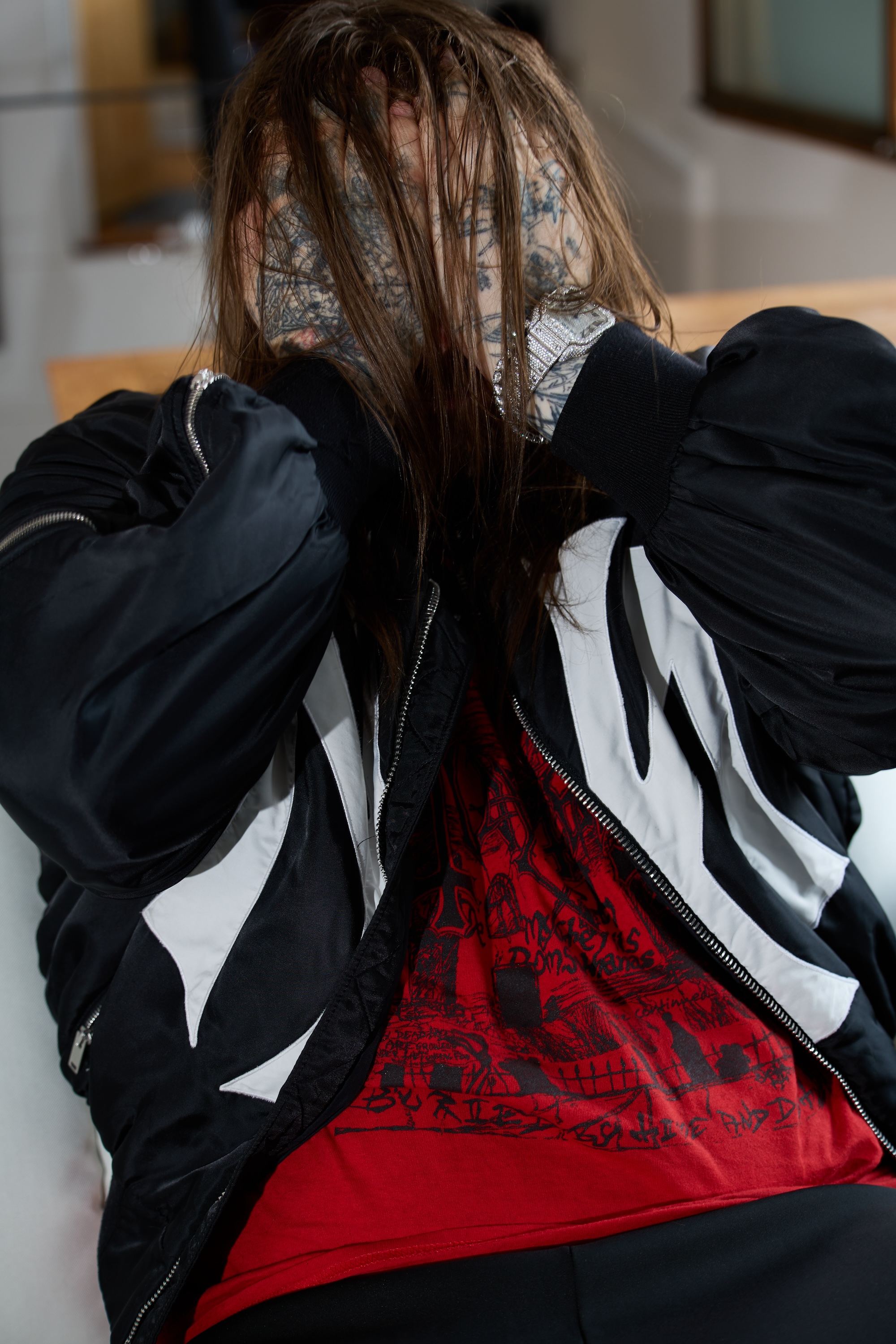
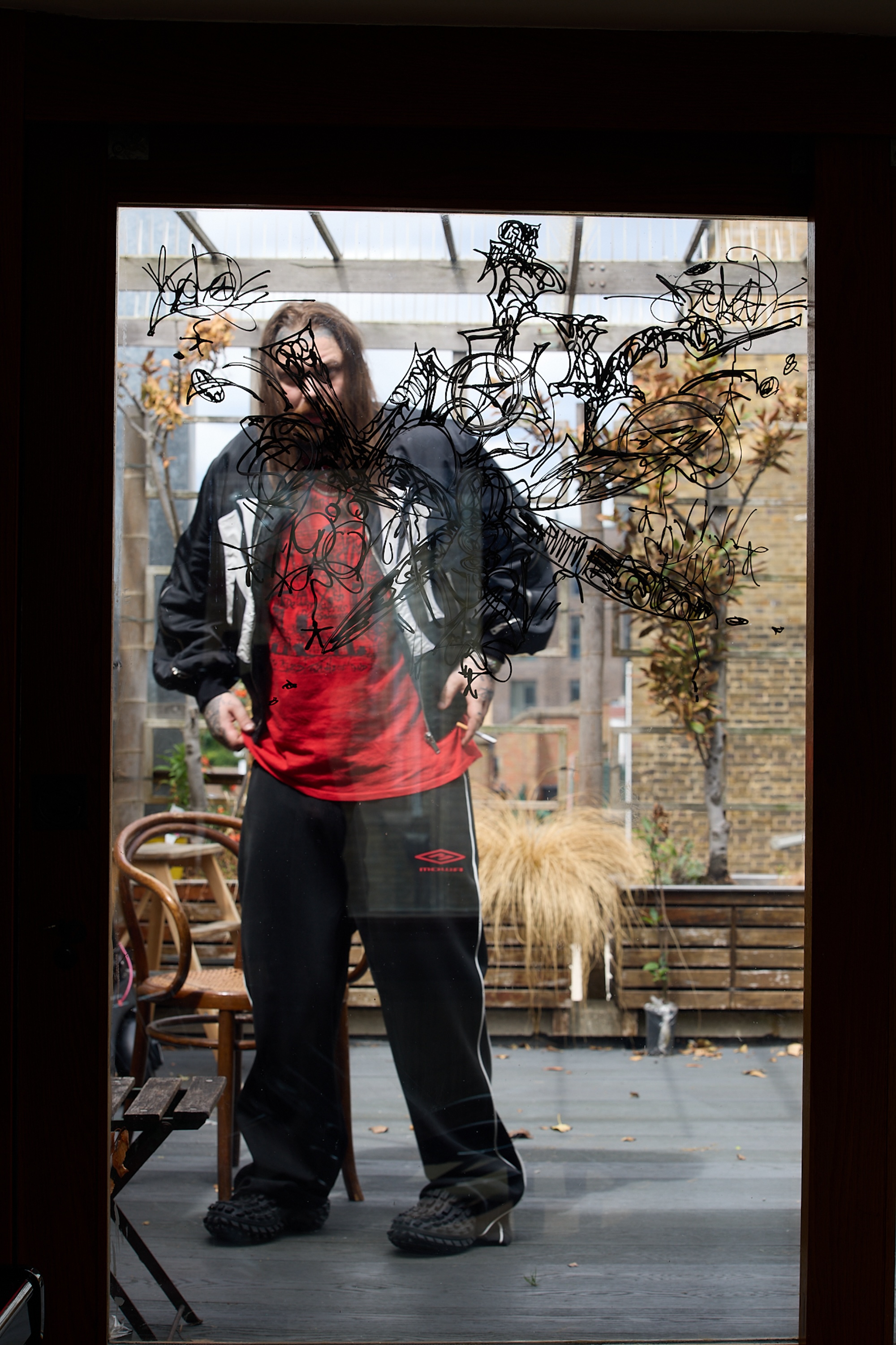
jacket MOWALOLA, t-shirt TALENT’S OWN, pants MOWALOLA
At this point in your life, what is it that brings you clarity? Are you searching for clarity?
I’m 33 now. I don’t know, I’m not searching for any clarity. I’ve seen a lot of my friends die from drugs or suicide or mental health fucking them up and shit like that. I’m not gonna lie, my mental health’s been pretty damn fried for most of my life. I've been struggling with hella anxiety and depression, low self-esteem and antisocial behaviors and shit like that. But lowkey the day I turned 30 I was like, “You know what? I'm so blessed.” My parents — who I fuckin’ love — they threw a birthday party for me.
I stopped going to school at a very young age, and one of the things that made me stop going to school was 'cause I was so fucking bullied in school. I come from a small town, they would bully everybody. It was the 90s, there were no openly gay people, we barely had immigration. Even me being a white, kind of straight guy, I had problems in school because in a tiny village in the north of Sweden, you don’t have to do much to stick out, you know? One day they gave out [superlatives] to all the kids who were gonna start high school. Everything was like “Jock of the Year,” “Sexy Bitch of the Year,” and then they were like “Fat Loser of the Year” and they gave it to me. I was the only sixth grader that got something.
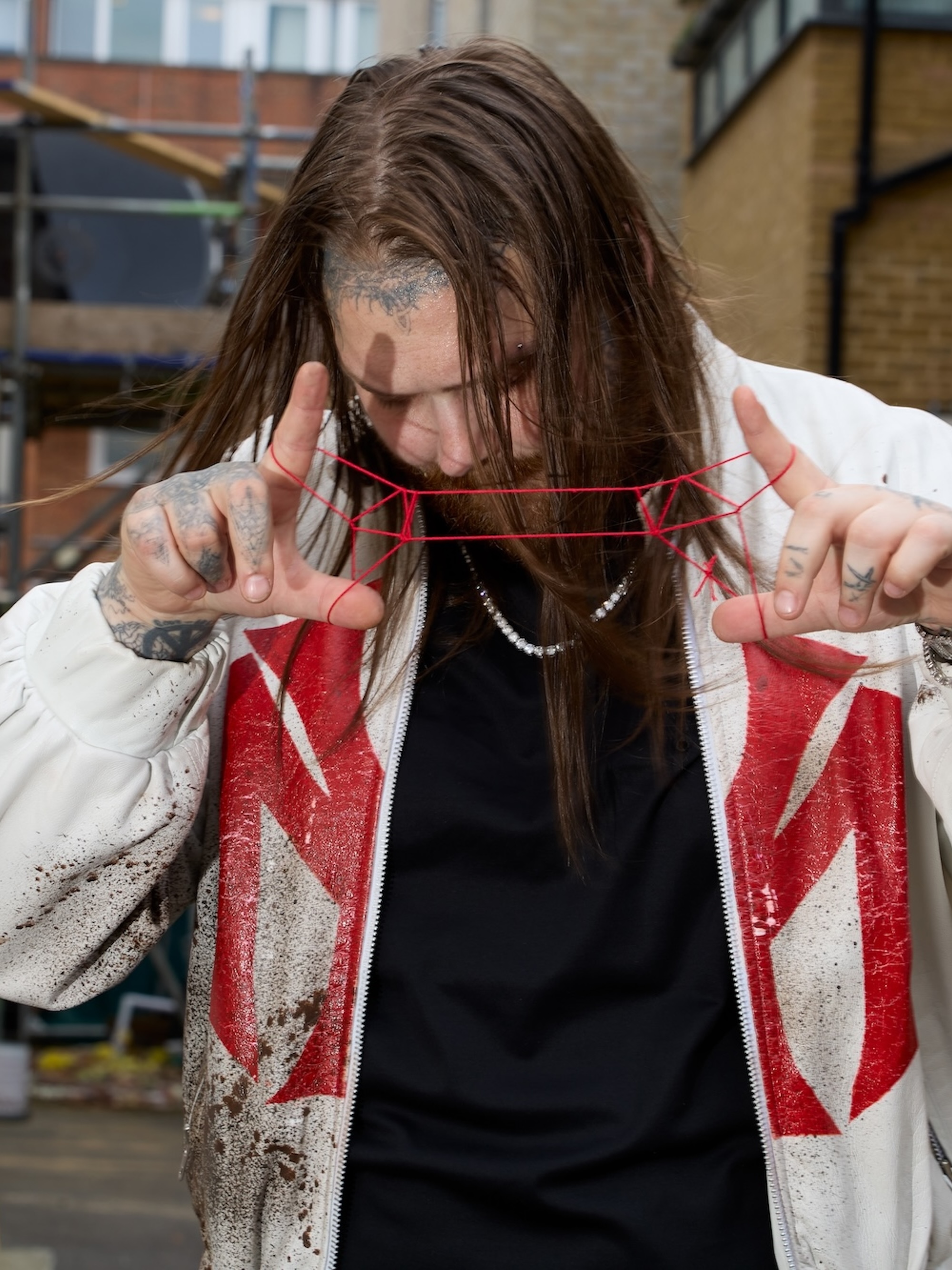
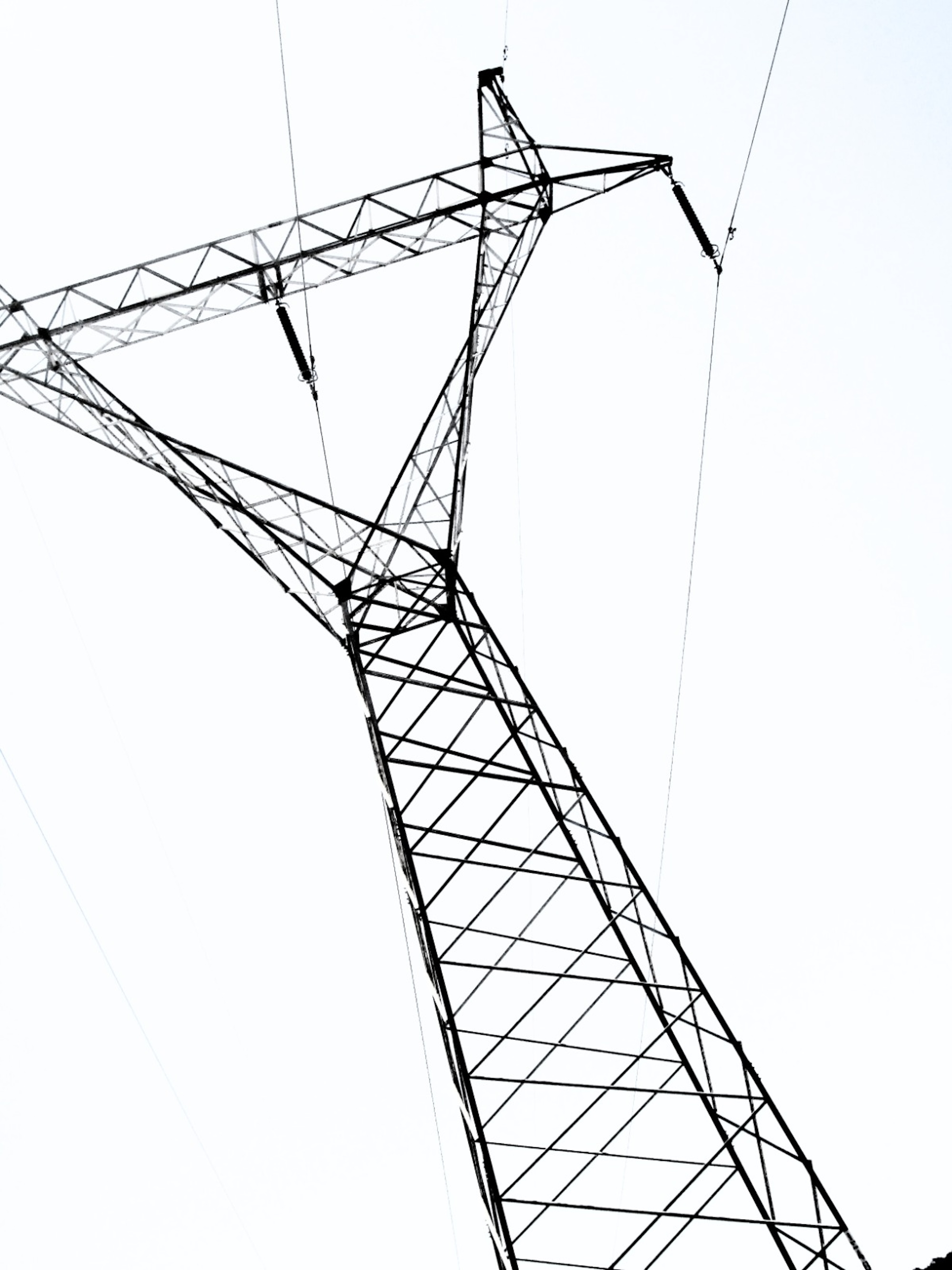
jacket MOWALOLA, t-shirt TALENT’S OWN, pants TALENT’S OWN, jewelry TALENT’S OWN, shoes BALENCIAGA
That’s fucked up.
That shit was so humiliating, and my principal forced me to go up and get that prize while the whole school was laughing at me. I remember because the room that this happened in was one of my favorite rooms. We had this very beautiful socialist wall painting in this room, and [since then] that painting and that room has always been stuck with me like a fucking nightmare. The room that was something I really liked turned into something that just made me feel like I wanted to disappear, you know? And on my 30th birthday, my parents threw me a party in that fucking room bro. And it was crazy.
I kept thinking that all my friends from my childhood are dead, because most of them are, but I was sitting there with a few of the survivors and my parents. That day kind of changed my life. And I'm not gonna lie, bro, for the last three years I just been happy and on my shit. People are stressing about turning 30 because they still feel like they haven't reached anything, and I lowkey felt that too. I was like “Damn, I haven't done shit.” And then I was like, “You know what, bro? I’ve lived my own damn life by my own damn rules, my whole fucking life, bro.” And I'm gonna keep doing that.
That’s amazing, bro, honestly. I feel like a big part of social interaction in general is just being a reflection of the energy that you get around you, both the negative and positive. You talk about how the bullying affected your sense of self, but it’s the love of your parents that helps you see the light in everything else.
Yeah, but also these bullies, bro, what the fuck do they do today, bro? They do nothing. They do jack shit. They work at the local gas station in my hometown. Fuck y’all! I'll make your yearly salary in a day, in an hour. I'll flip that in an hour. Bitch ass punk.
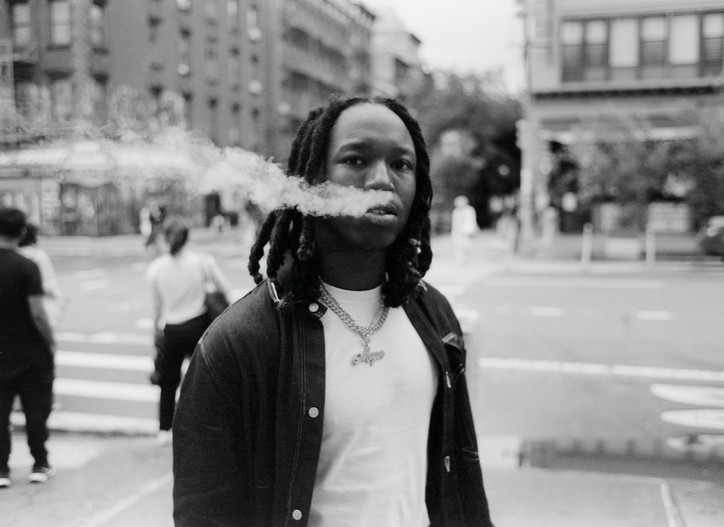
In the time it took the 24-year-old Charlotte rapper to record this album, the third of his career, he struggled with finding the right name for it. On the day of its last recording session, MAVI enjoyed a card game with a girl he often played with. She asked him to sign the card on the top of the deck, so he did. “MAVI is in New York working on his untitled album,” she then wrote on the card. “I'm going to keep these for your shadowbox,” she added after. Ding ding ding.
As MAVI now sits across from me outside of MUD, an earthy cafe in the East Village, his voice cuts through sounds of clinking glass and neighboring dialogues, illuminating a watershed moment for the most methodical piece he’s ever worked on. “When she said that, it was like, ‘That's exactly what I've been making,’” he muses. “I've been putting all of these different failures and triumphs and experiences into this fuckin’ 3D frame for people to play with.”
MAVI is patient and measured with his words despite Manhattan’s incessant racket, never really raising his voice until the conversation opens up to shared laughs and colloquialisms. Even then he remains even-keeled. When he's not contextualizing his music, he paints pictures of his future away from it: One day he’ll jumpstart his nonprofit and give out free laptops to kids in Charlotte. One day he’ll teach biology where he once attended high school. One day he’ll be revered for much more than the words he’s spoken into a mic (even though he plans to keep rapping 'til he's dead). Among other things, MAVI opens up to office about his appetite for literature, the friendships he's built through music, and the process behind shadowbox.
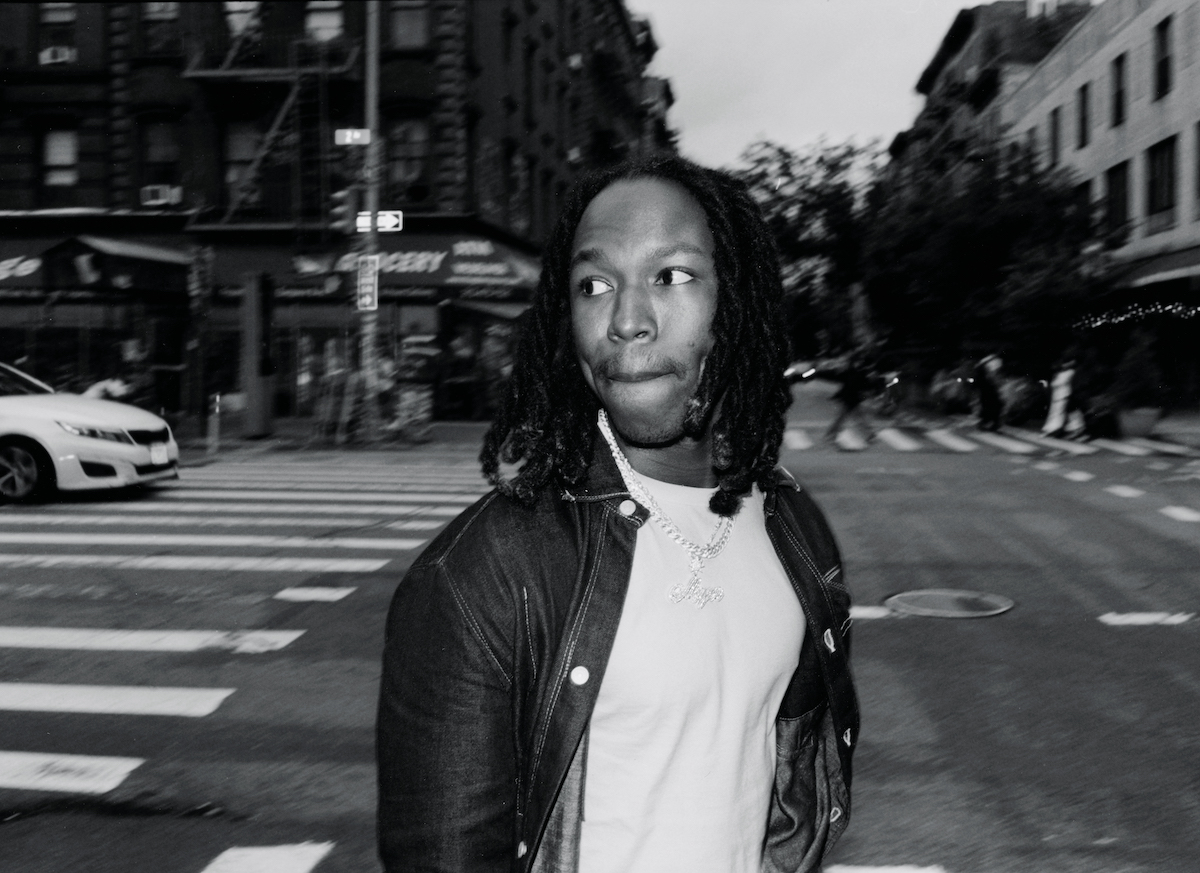
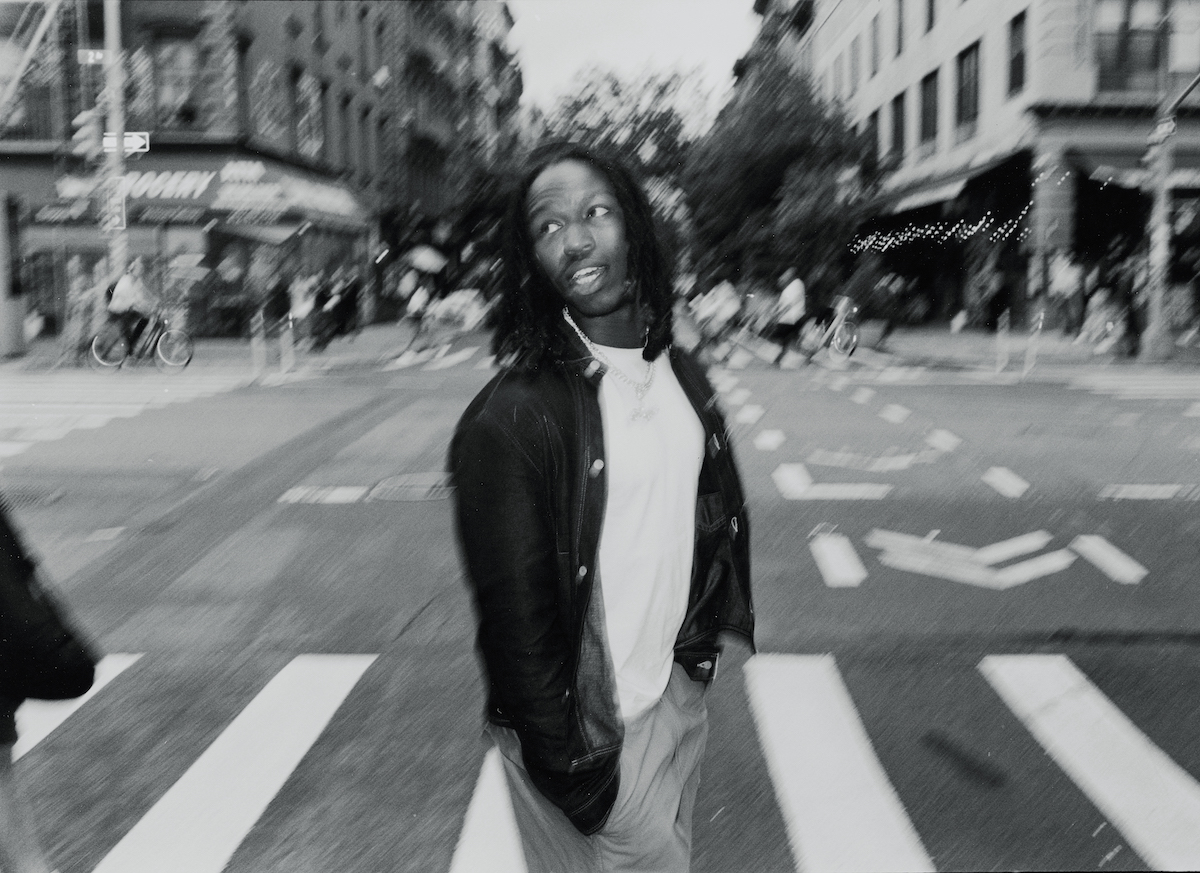
Olivier Lafontant— How do you feel like this new album is a continuation of you processing the interpersonal struggles you’ve gone through?
MAVI— I think for this one, I was making the songs because of a lot of chaos happening in my life at one time. And I was making the songs to document what was happening so I could try to map out the lesson or the message of all these events in my life. And so that became the backbone of the album, the path that was drawn through [me] being pulled in so many different directions.
Something that’s a common theme in your work, especially this time around, is how meticulous and artful your rollouts are. I've seen the art pieces that you’ve been posting on your Instagram, for example. How do you feel like the visual components serve as companions to the music?
I wanted to craft a language — like an aesthetic language. So things being carefully arranged, things being voyeuristic throughout the album, me speaking from a removed perspective about myself; these are all things that I wanted to visually express through shots in the music videos or things like the tracklist or the tour poster. And then also because I'm talking about things that are cyclical — addiction, love and loss, transformation — I wanted to display it in a systematic way. And then also being really tactile: The album cover is a platinum/palladium print and it was mastered on tape. Adding a degree of physicality to everything, [like] having an incense that comes with the vinyl [has been important]. These songs are all things that happened to me those days that I made them, and then over time they’ve become like a photo album.
What do you hope to accomplish with this record?
I want people to make this record their own, feel humanized through it, and humanize me through it. And I want people to stand in front of the painting, even if they don't read the placard, even if they don't buy the painting. Just stand in front of it and feel moved. Because I think moving people is the one thing nobody in music marketing or music strategy really thinks about. It's like, how do we take this music, whatever the music is, and then get people to move as a result of it?
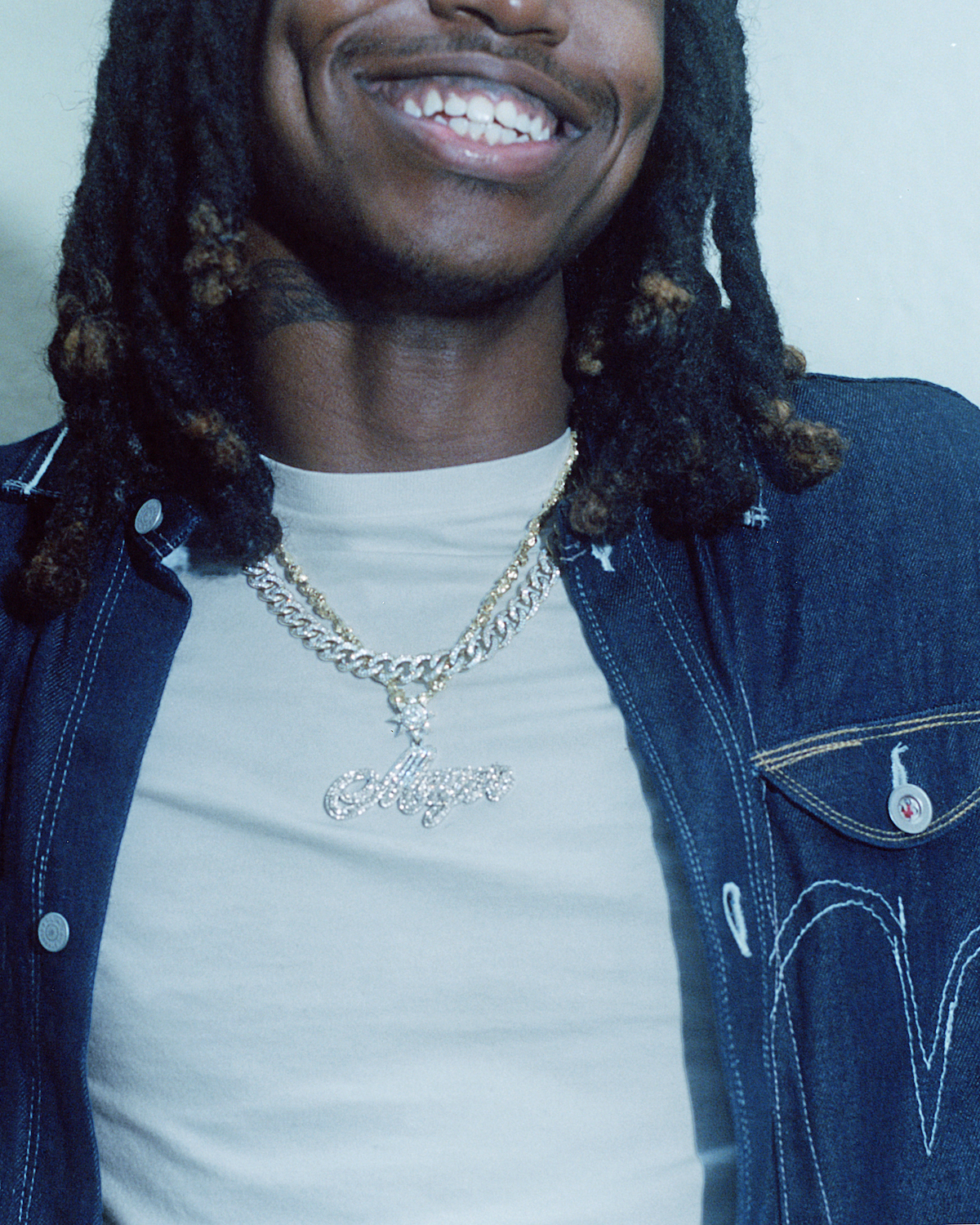
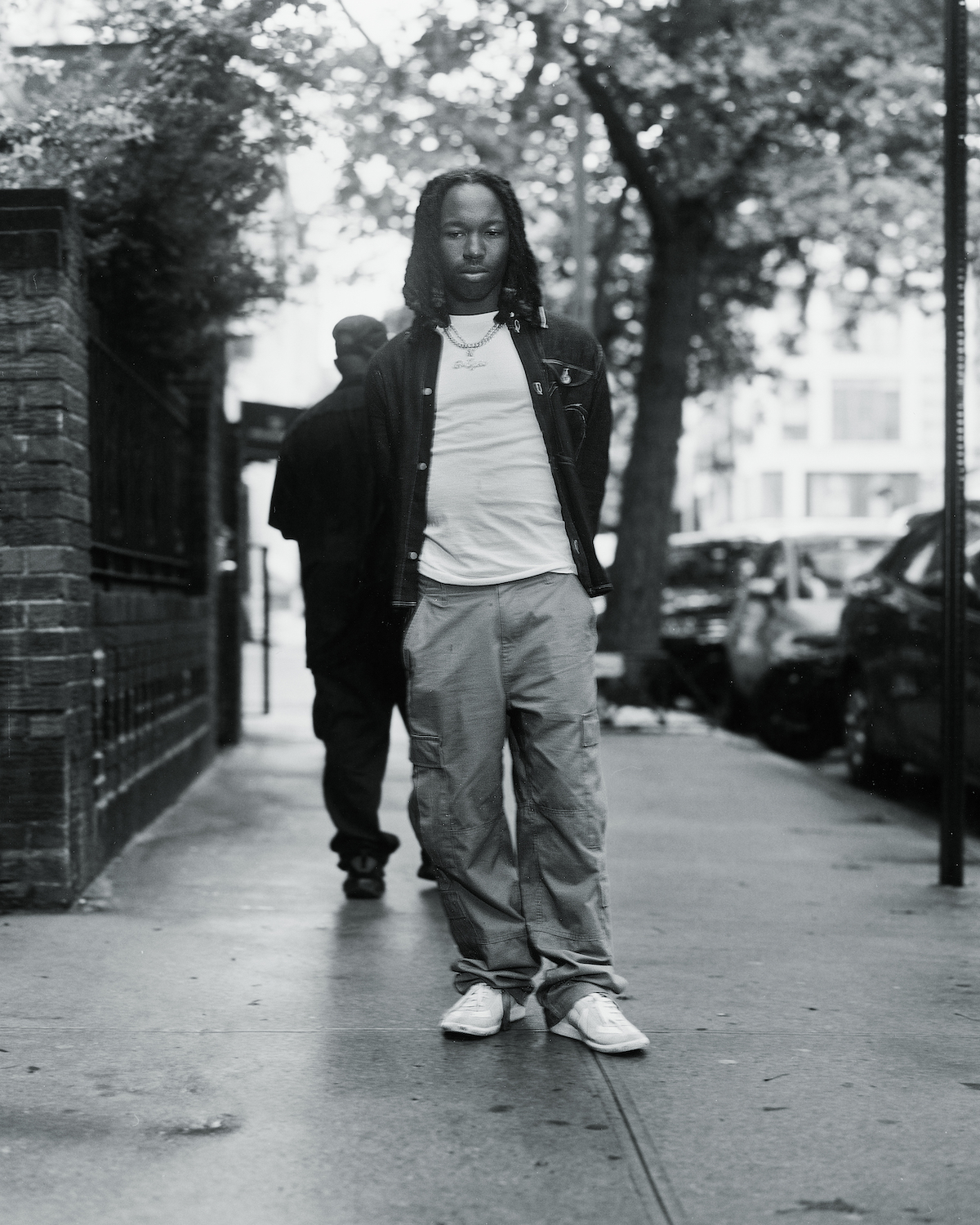
Could you describe a transformative experience that's happened since the release of your last album that's helped inform this one?
Oh, man. I’ve had a lot of transformative events the last week. I've bought a house since the last album. I broke up with the subject of the last album, got with somebody else, and broke up with them. One transformative event has probably been going to Paris, going to their modern art museum, and really understanding [that] I was overthinking art. Me thinking I was not informed enough to understand art prevented my access to being moved and building relationships with artists and art, on the visual side. So I removed that barrier, and that's when I really started to take in design and digital art as something I can understand, play with, and leverage.
Was working on this album the first time you had that much of an influence on the artistic side of things?
Definitely. A hundred percent.
Something that really sticks out to me is when an artist like you is so poignant about the vulnerable experiences a normal person may be ashamed to display on a pulpit. How do you accept that? Does that weigh on you while you’re performing?
When I first started rapping I didn’t want my mom to know I was rapping. And not because rapping is something she would not want me to do, but because of how I was rapping about my own life. And that there were things that I felt empowered by sharing with millions of strangers that I was afraid to share with my mom in that same naked way. So I definitely have run-ins with my own vulnerability in ways that are not just a super warm hug all the time. But I think it's worth it for me because it helps me understand myself. I can rap something that I can't intellectualize and then draw meaning from the rap song. So it's therapeutic, cathartic, whatever. You know?
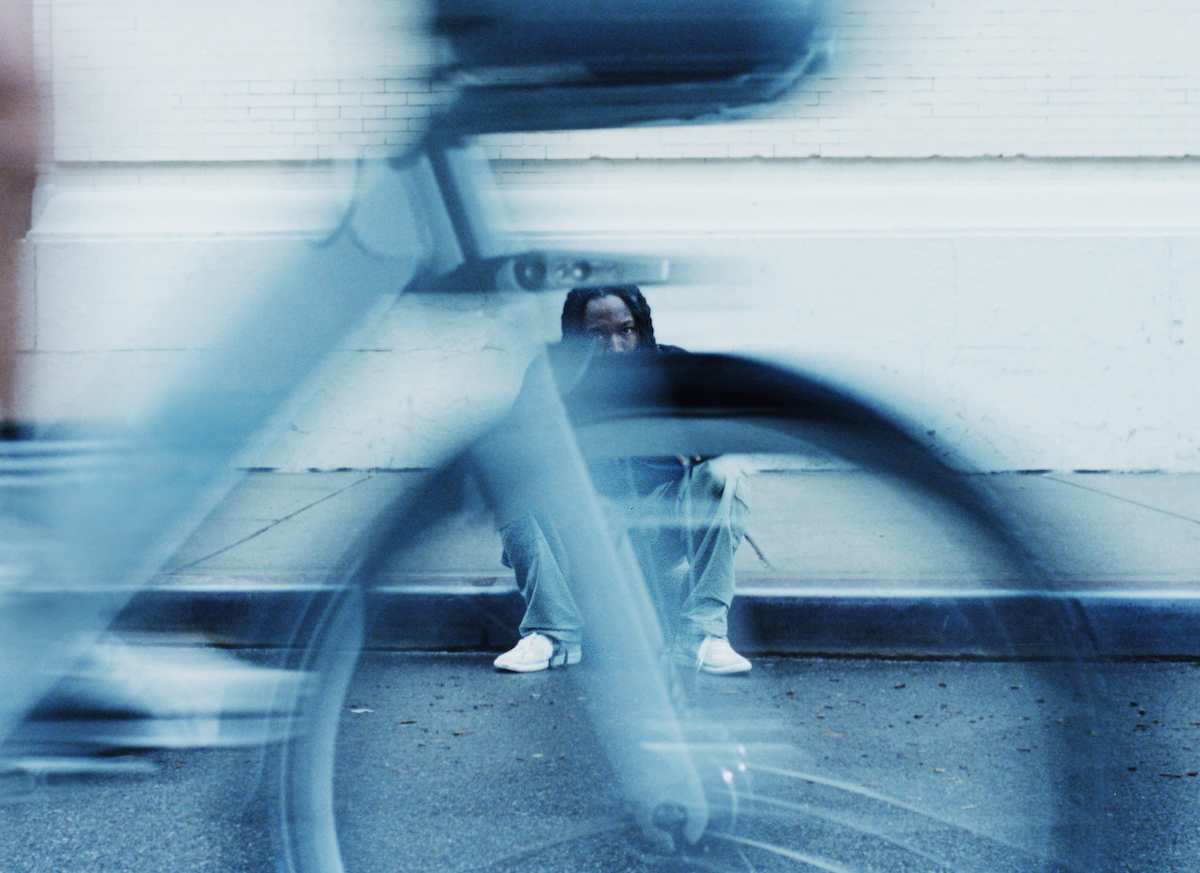
I definitely feel like because you take that role in your music, the listeners take in what you give out and it helps them contextualize what they go through. Do you feel an obligation to do that, or is it just a natural outcome?
I don't think I feel an obligation to it because that would make me eventually grow to resent doing it and resent the listener [as well]. And I don't think it's something that's necessarily natural to do either, because it's more traditional in rap music to write about stuff that makes you feel cool. But what I think it is is a kindness on my part, like a loving act. That's how I think about it. I need my listeners. Even if it's one of them or two of them, I need them. And because I need them, I will allow them to use me and my story to better love themselves. I think I can go to heaven off that.
Speaking from personal experience, Let the Sun Talk was an album that I played a lot during quarantine. I feel like having that level of companionship, even if it’s through somebody you don’t know, is a crutch.
Right! We’re friends! And that's the thing about Let the Sun Talk that makes it special, even beyond anything in the music, is the context. So just being there for people when it’s relevant is also a part of the mandate for me to [do this], you know? To be there at the right time in the right way.
On shadowbox, you only have one feature on the record. How intentional is it for you to give yourself as much space as you do when it comes to tracklisting and putting out your own work?
I’ve never had a rap feature in my entire career. I kinda don’t know how to make songs with — well, I know how to make songs for people. You can give me the space and I can give you something really great.
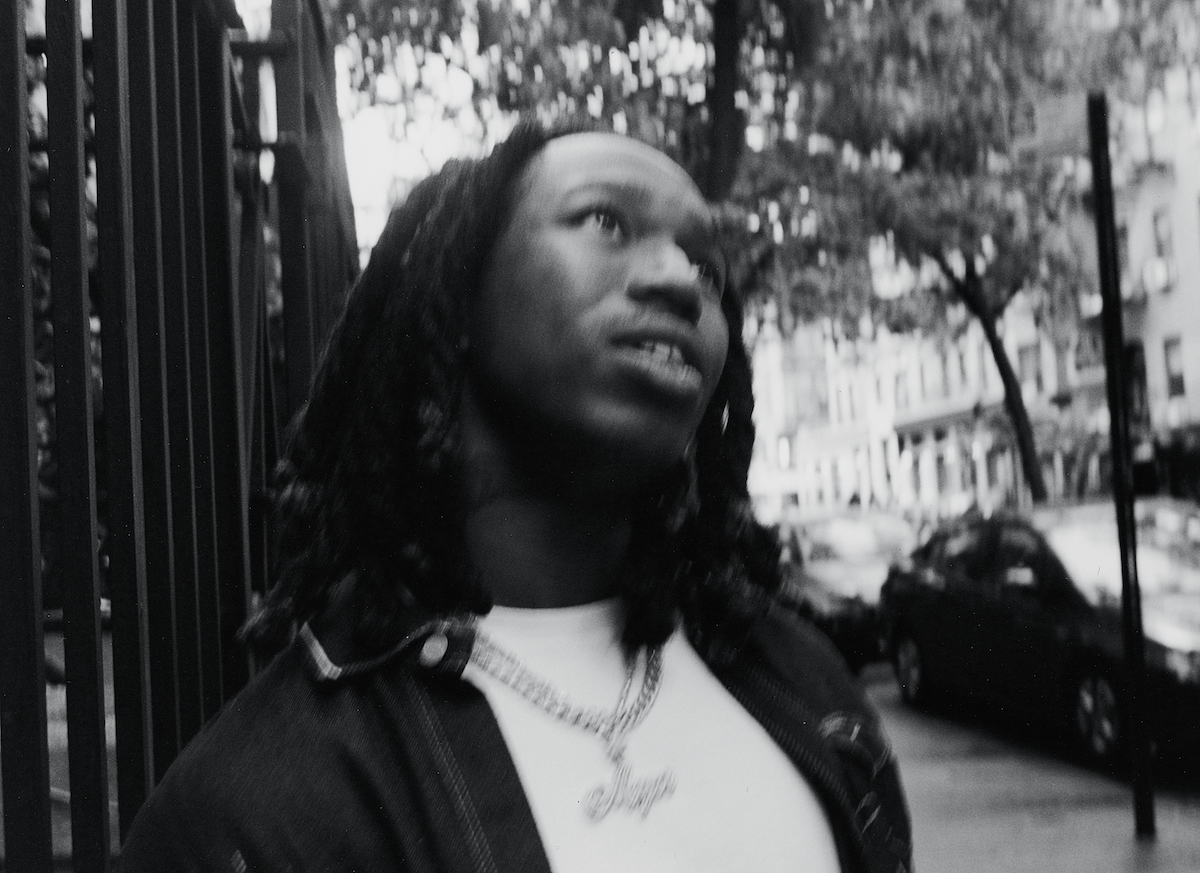
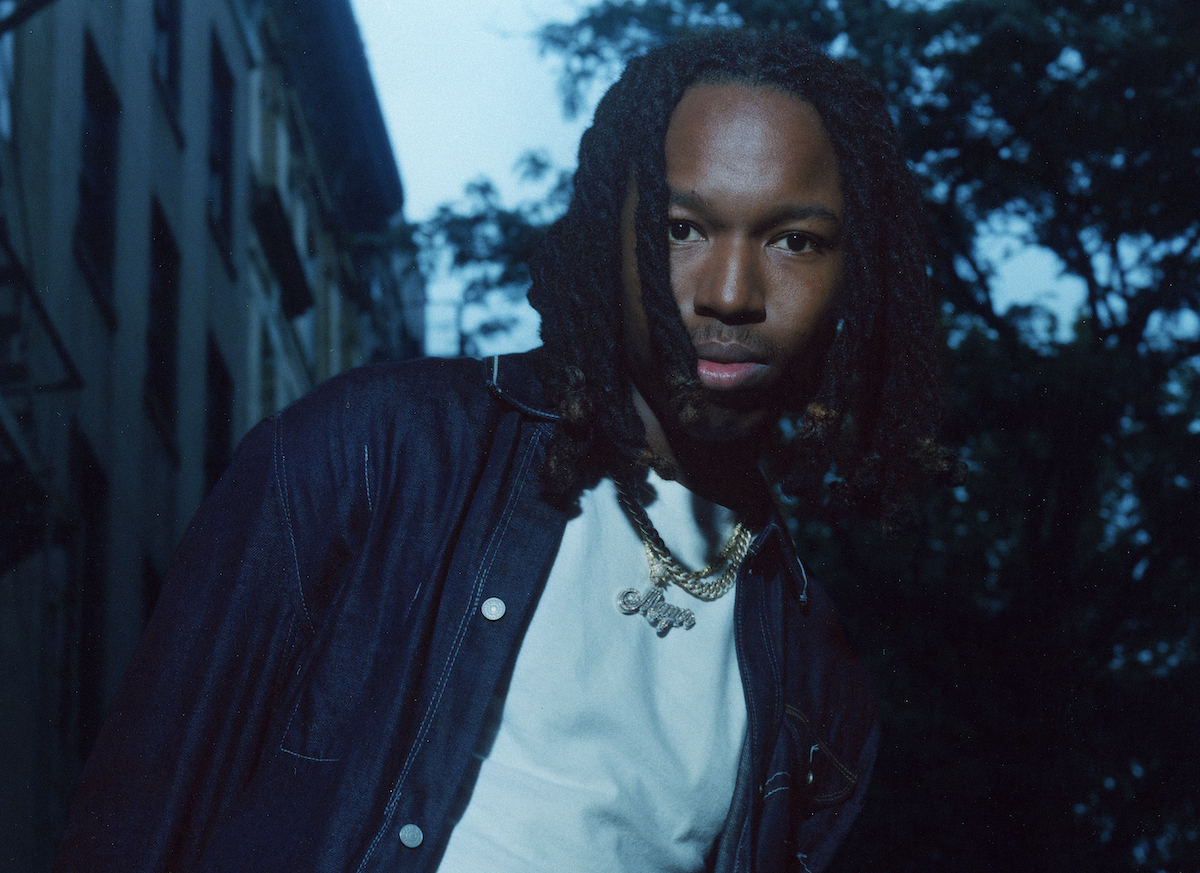
Even “EL TORO,” [Earl Sweatshirt and I] made that separately. Like Ovrkast sent us both the beat and we both sent in a verse on the same night. And [Earl] was like, “Yeah, we're doing this.” I don't really know how to rap with other people that well. One thing I want to really do, I wanna do a “friends tape” 'cause I have so many rap friends, and we have so many songs. Because even when we think about [James] Baldwin or just art in general, the community that art established is almost cooler than the art itself. Like there's this photo, I think it's like Basquiat, Grace Jones, [Keith Haring], and like Fela [Kuti] or some shit. That shit is hard. Just that everybody's art is in communication with each other's art is one of the most rewarding parts of learning art history. So I’m definitely trying to get better at that. I think there’s one person who’s ever outrapped me on a song, and that’s MESSIAH! He’s my final boss. But other than that I don’t think it’s happened.
Not even Earl?
What you think?
I do love your verse on “EL TORO” so I mean…
Okay, thank you. But also I don’t think he would ever try to kill me [on a track] though. Me and him it’s like… You know how Darth Vader at the end of Star Wars with Luke, he kind of let himself die, forreal? [Laughs] On some torch-passing shit? The nigga be on some torch-passing shit. But I really do want him to try to beat me. With him specifically, the song where he tries to beat me up and I try to beat him up back, that would be the Earl Sweatshirt/MAVI song to come out on my shit.
What does the context have to be for y'all to get to that point?
I don’t know bro! I don’t think our relationship lends itself to that. And that's part of the thing too, like, think about it like this: Do you know me and MIKE have rapped together one time? It was the first day we ever met each other, we was at Sage [Elsesser]’s house. Me and MIKE never even came close to making a song after that. But it’s ‘cause I really love these niggas. I go out to eat with them, we do other things. We ain’t even establish our relationship in the studio.
Isn't it strange that the common thread is the music though? Do y'all ever talk about that?
[Earl] kinda impressed upon us the importance of us being leaders. We building individual castles in this kingdom. Sometimes we be having a lot of shit going on. Like me and MIKE just did our first show ever in London. That shit was cracking. I’m kinda saving [the collaborations] for myself now. It’ll be historical. It’s like if DOOM had a Madlib beat on Operation Doomsday, maybe Madvillainy wouldn’t have hit so hard.
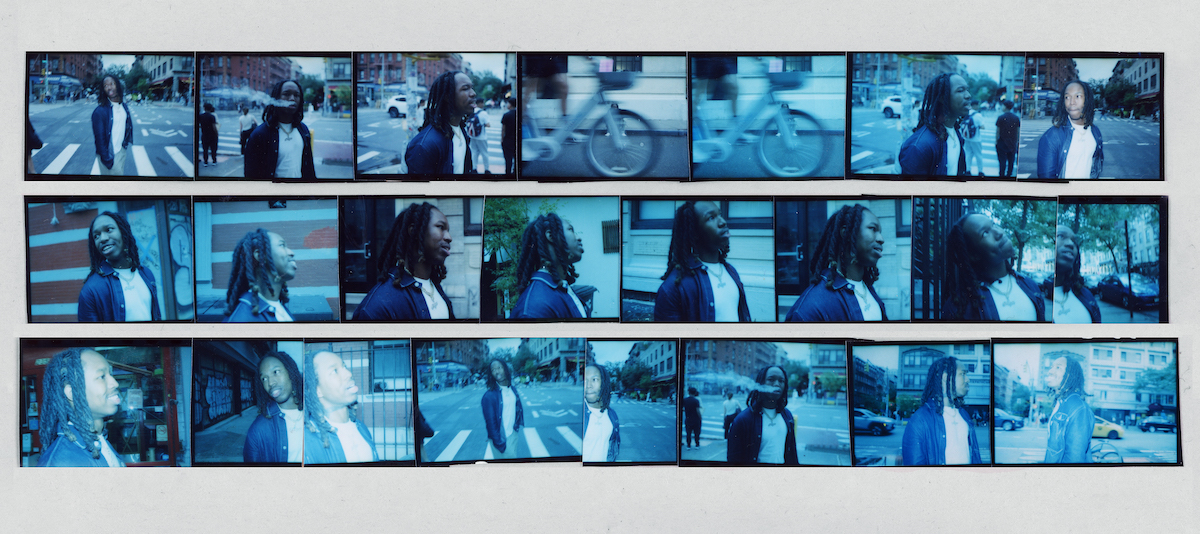
You’ve mentioned before how it’s really important for you as a rapper to keep reading books. What are your favorite things to pick apart from the literature that you read and apply to the music that you write?
I really like descriptiveness and detail. I was reading Sun Ra’s biography a while ago and it had a whole paragraph about this jazz nigga named Fletcher Henderson, whose music I don’t particularly like, but reading about him in the way they wrote it had me so intrigued. I want to know exactly what these songs that niggas is referencing sound like. That enriches my reading experience. It's like Harry Potter: they had the fuckin’ butterbeer shit. I had to have that shit.
On God, I wanted that shit so bad!
I had it! It’s fire! [Laughs] That feels so good! I love things that bring me into the world of the book.
There's a level of satisfaction that I get from reading a description of something that I didn't have words for prior to reading that.
Right! That’s all I wanna do as a songwriter.
Lastly, you speak a lot about the importance of your proximity to blackness, both physically and in terms of your family lineage. Can you go into detail about your attachment to your ancestry and how that informs how you carry yourself?
One thing about this album is it's rather churchy. “the sky is quiet,” “drunk prayer,” “open waters” . . . This idea of wanting to be cleansed in the water and the blood to be made new. I use the religiosity [from within] the tradition in my family to tell that story. I ain't pay my fuckin’ [Ancestry.com] subscription, but I've been making [family] trees, and I got up to like 1855, pre-slavery. My family, they're from South Carolina which is a huge slave port, but also damn near the closest thing we got to where black people sit still forever. When I was at the show in London, there was these pretty ass Ethiopian girls. And they came up to me and one of them was like, “Aw, your show was so good! Where are you from?” I'm like, “Yeah, I'm from Charlotte, but my family from South Carolina.” And she was like, “No, where are you really from? Like where in Africa?” I'm like, “I don't know.” You know what she told me?
What?
She said, “You should really try to figure that out.” [Laughs]
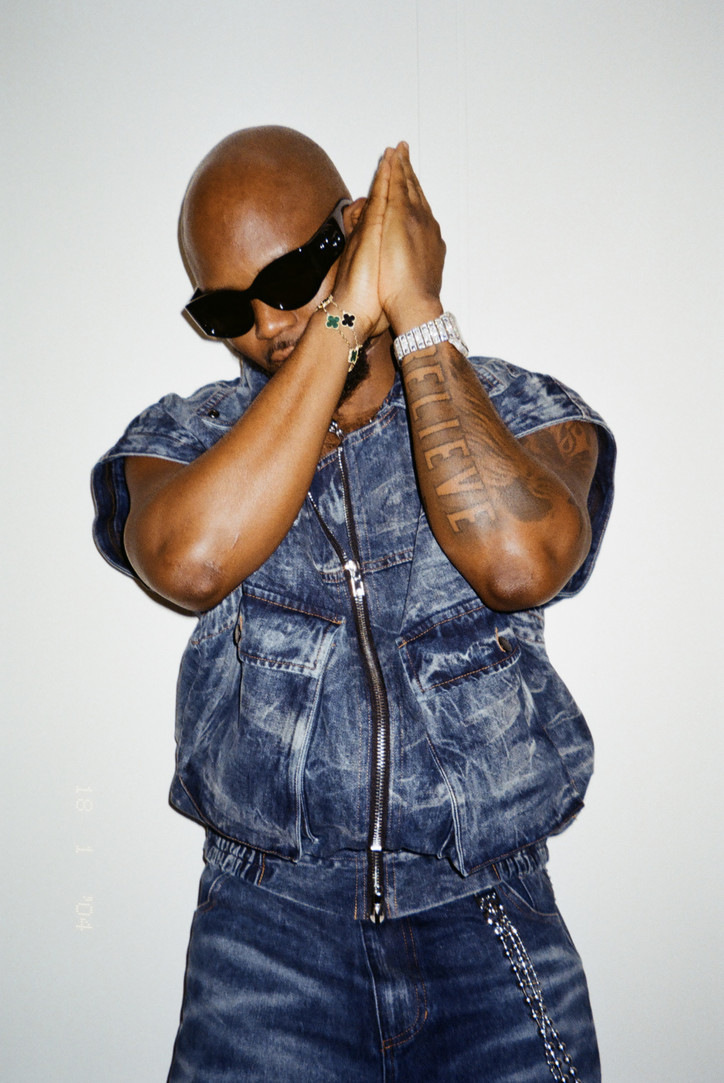
But it was during his university years that everything truly fell into place. Releasing his music on SoundCloud in 2017, King Promise quickly built a following, and soon his buzz went from local whispers to nationwide chatter. King Promise sees Afrobeats as a movement that’s already crossing borders and breaking barriers. Now, with his music continuing to ascend, King Promise has his sights set on global domination — not just for himself but for the entire genre. His recent album, “True To Self” is a reflection of this vision and bringing people together through music.
As KP prepares to take off on his worldwide tour, office caught up with him during his New York dates.
So, how has your time in New York been?
Good, good. I like the city. I do come back often.
I heard one of the shows got rained out.
Yeah, man. The first one, Summer Stage Headlines. But hopefully we can come back and make it happen.
But all the rest went well?
Yeah, everything else was good. We’re off to LA tomorrow.
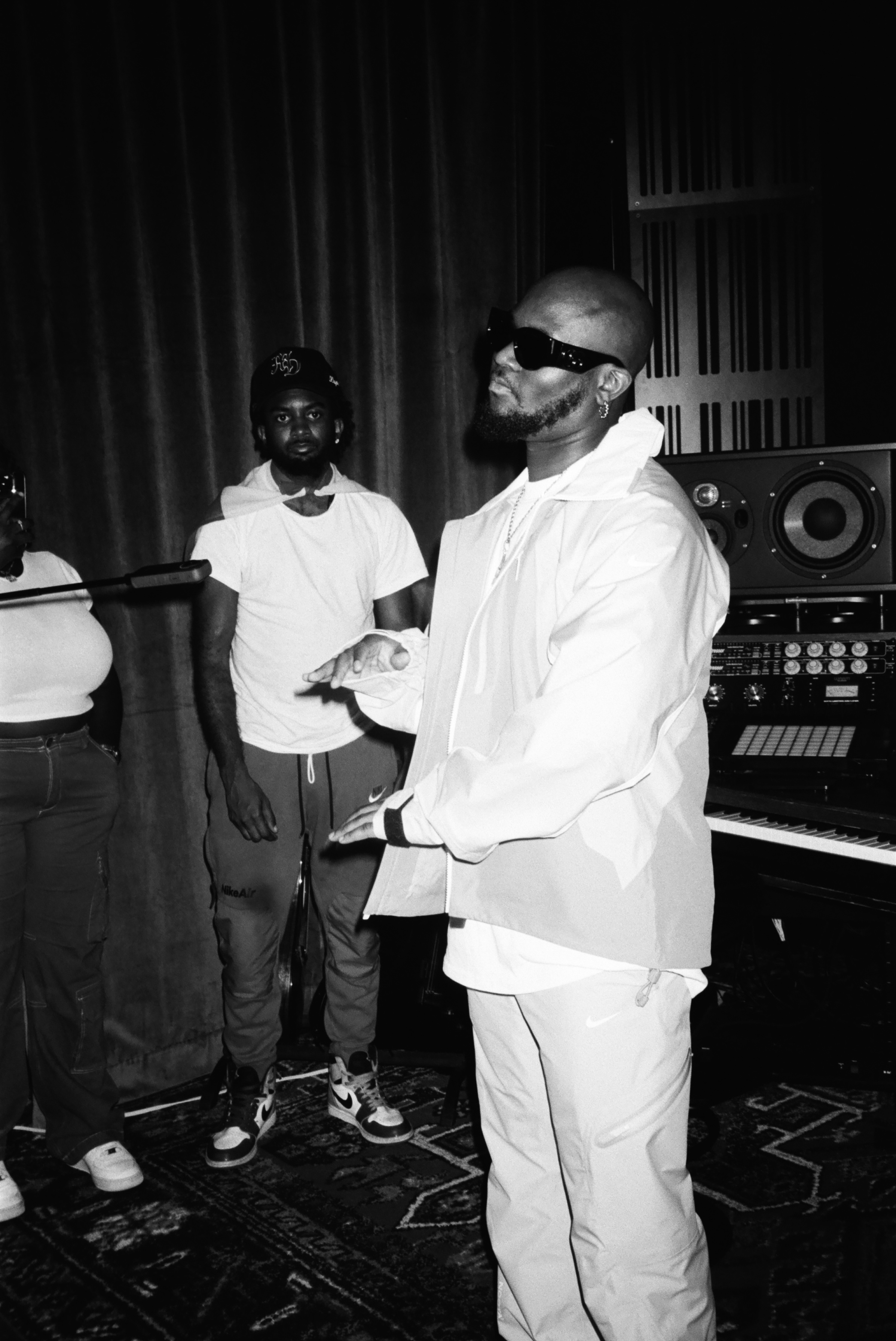
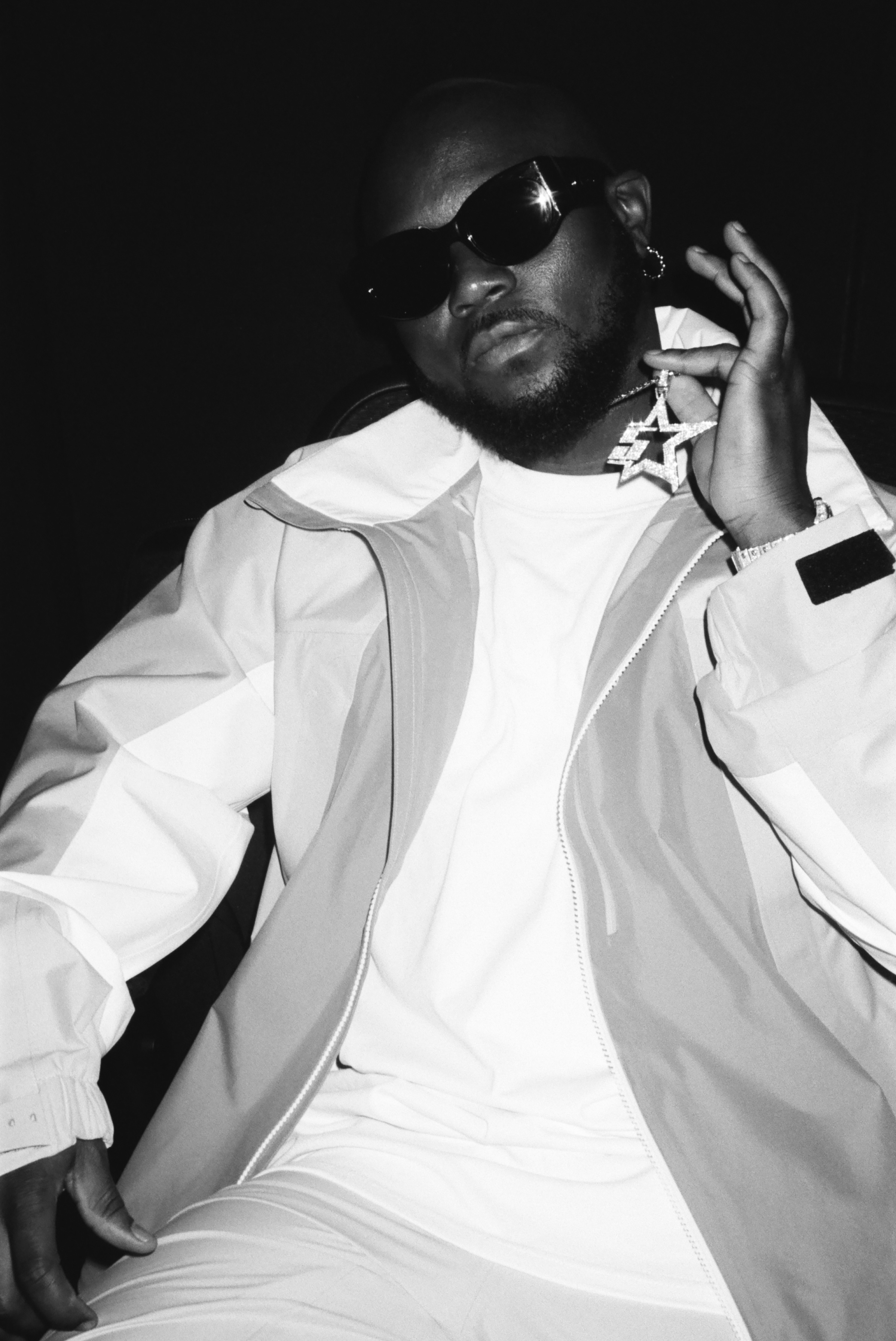
Can you tell me about your upbringing in Ghana and how you got started in music?
Yeah, I was born and bred in a Accra, Ghana. I grew up in a very average family, the only guy. I blew up in my last year of university. I have a BSc in Business Administration, my Major was Marketing. I had the hobby, which was making music. I had the passion for it as well, but eventually the passion kept growing. I kept pushing. I didn't know what I was going to do after school, I’d probably look for a job or whatever. And yeah, after I blew up I was like, ‘you know what?’ This is exactly what I want to do with my life. And the rest has been history.
Was it something that was in your family? Were you around music when you grew up?
Yeah, my dad played a lot of music at home. So my dad had a boutique when I was growing up and usually when I closed from school I’d go watch over it. And he had the speakers, huge speakers that played loud music to the streets and he had his CDs and whatnot and I got to handle that a lot as well. So basically his taste and music influenced mine before I became a mind of my own and started choosing what I really liked.
What sort of boutique was it?
Clothes, fashion. Both men’s and women's.
That's cool. Did that affect your style now?
A hundred percent. From when I was a child, my parents dressed us up. My mom and my dad met when they were buying clothes in an open street market in Ghana. And when we were kids to a very older age, they literally dressed us up all the time. It was like a thing where looking good was part of how we grew up.
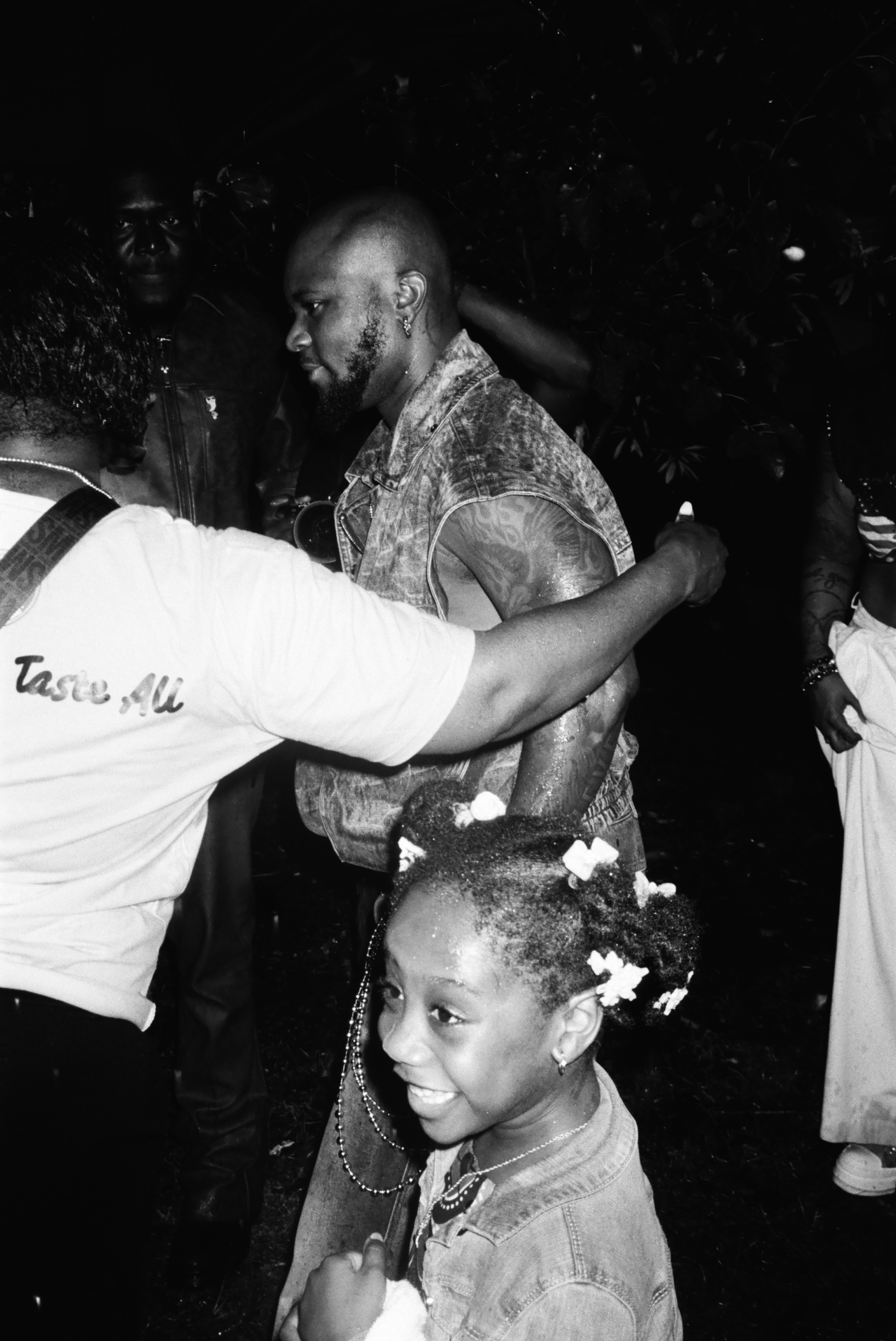
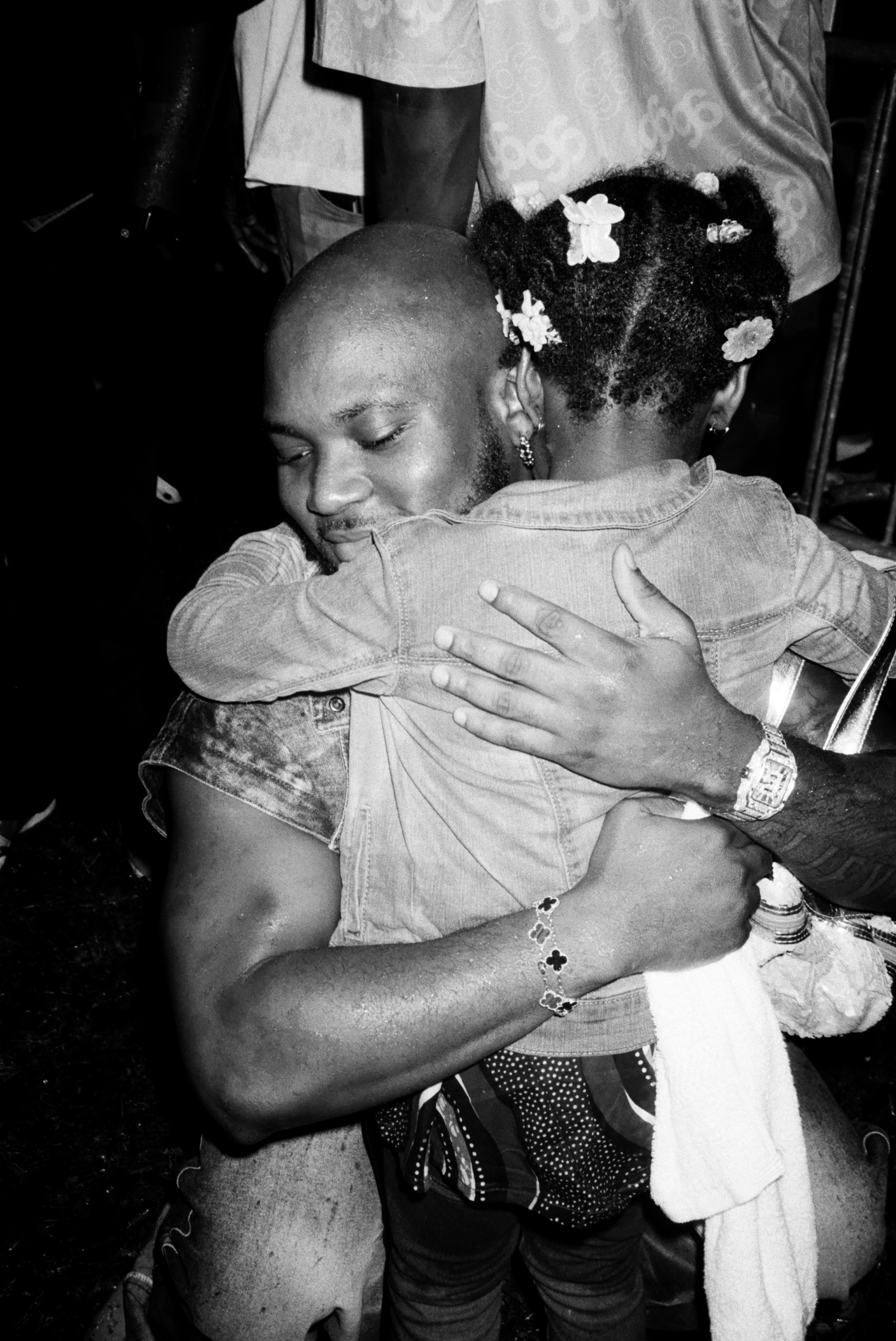
Does performing in the US have a different vibe to when you're performing in Africa or other parts of the world? Do you see a difference?
Every city, or every country, continent or whatsoever have their own type of audience, fans. It's just different. Performing in Europe is different from performing in America, definitely. Performing in Africa is different. But they all have something distinct about it where it's love. It's just shown differently.
It feels like Afrobeats is growing all around the world. Why do you think that growth is happening?
A hundred percent. The music is good. When you hear African music, you just want to get up and dance. You just want to move. It’s feel-good music. Do you know what I mean? It's not really about violence or guns, none of that stuff. Its usually just about having a good time and speaking about life and what's going on with our community. So it's always feel-good, happy music. And obviously it makes you want to move your body and it's just a matter of time until Afrobeats becomes the biggest genre in the world. And I could attest to the fact that it will be, because as you can see, it's taken over.
Do you think there's a reason that it's now getting a spotlight in mainstream or Western culture?
The music itself is really good, it just needed a platform, people to hear it. It's not a new genre. It's been around for a while, but it took people before us to pave the way for us to get here. And we even have to do much more for the next generation that will come after us. And for me it's beautiful, as an ambassador of my people to the world through my music to do what I do and I’m just super proud of the fact that it's ours. Do you know what I mean? The world loves it and it is a beautiful journey.
How would you describe your own personal sound?
Melodic. True. And jiggy.
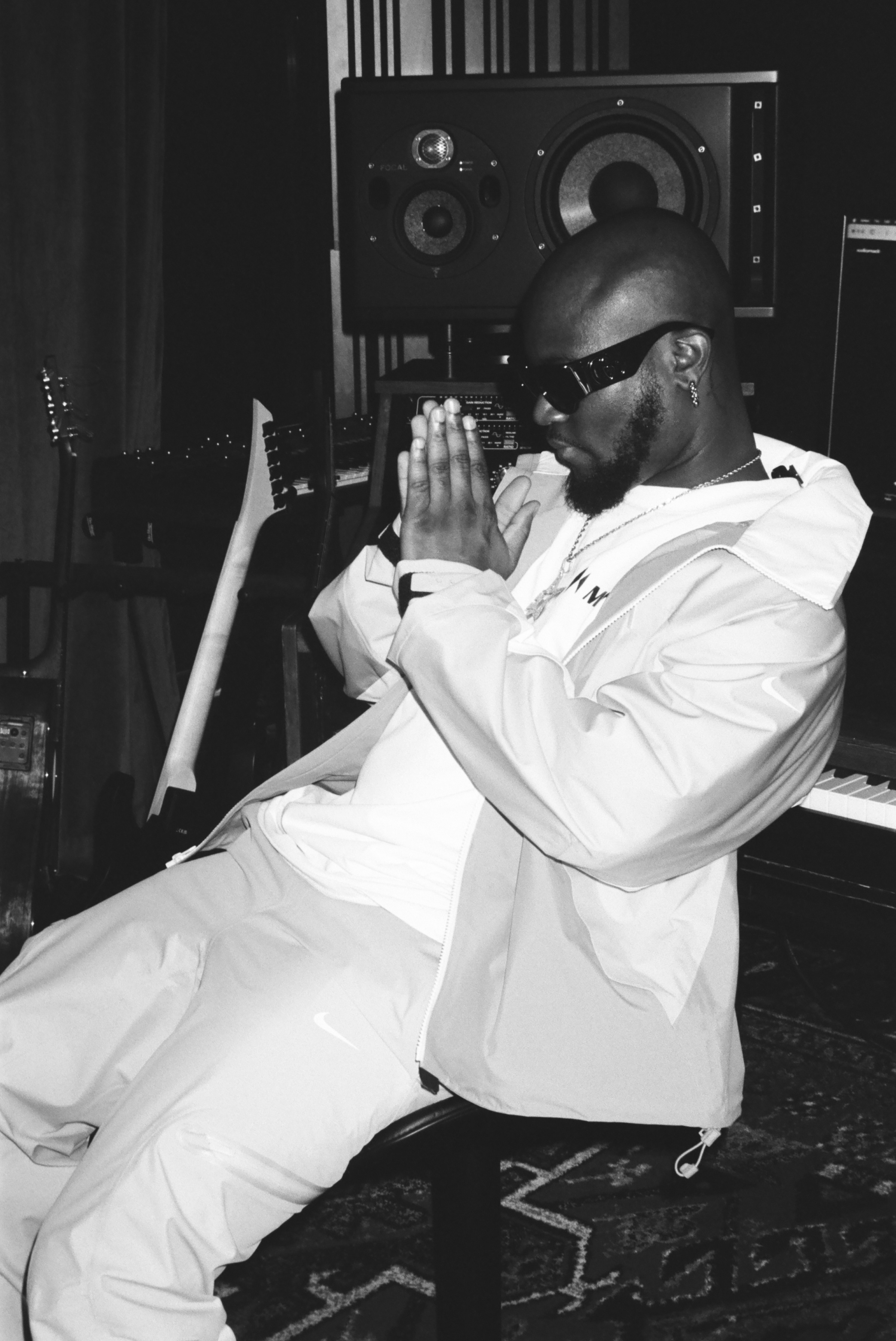
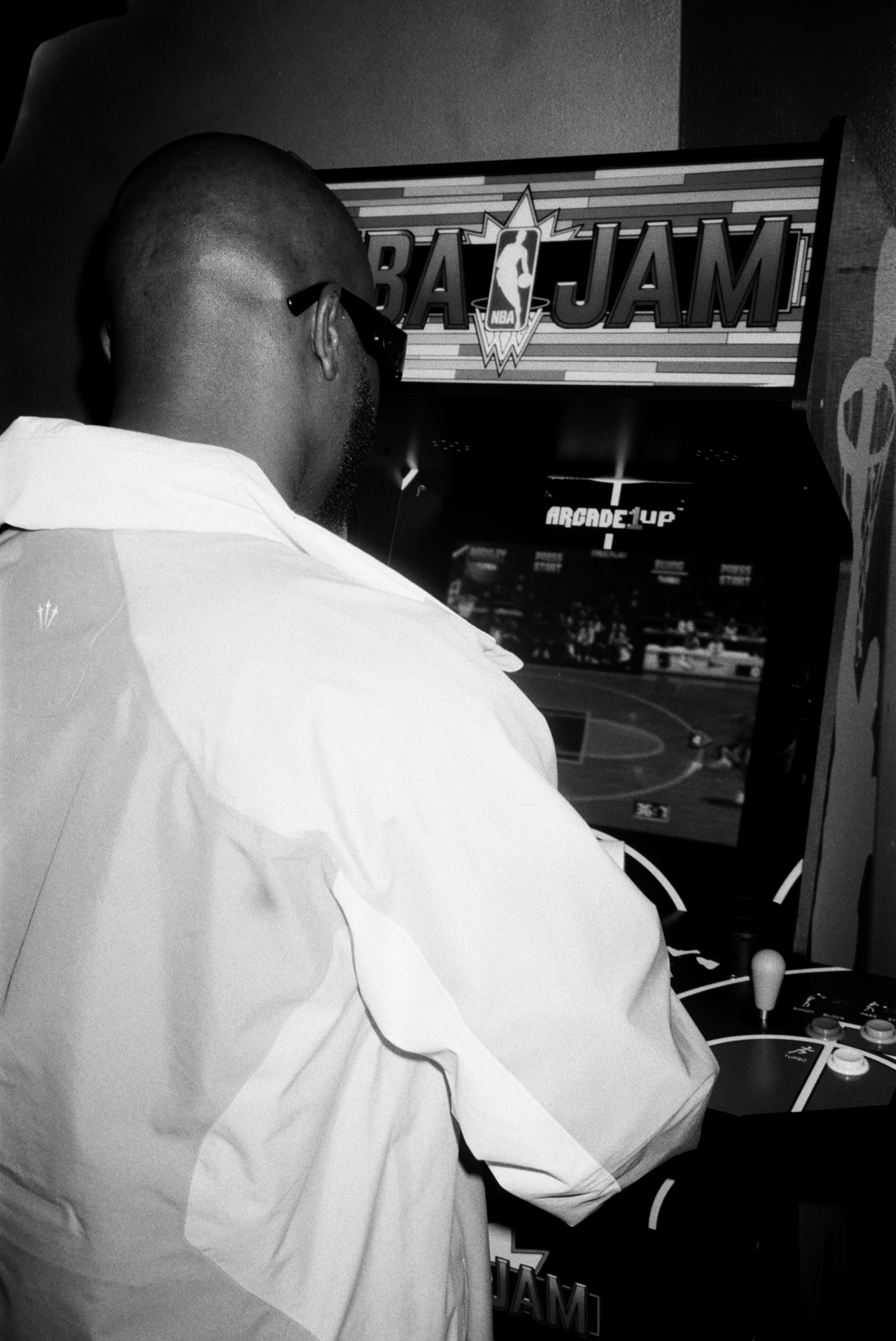
How's the response been to “True To Self”?
Amazing, man. It's been a month since it dropped and some change and it's just good to see that people really love it and fuck with it. Obviously there's a few hits, couple hits, maybe a lot of hits on there. So it's just a great feeling that people appreciate the sound because I really made it from a special place where it's music that depicts a part of my life or my journey, my career and how I truly feel. Because it's not just words, it's more special than that.
What do you feel is next for you? What's the next chapter?
We always keep pushing. The plan is always to do better than we always do. Always next level stuff. Obviously I've started a tour, so I'm about to do Asia, about to do Europe, the UK, Africa, and also going to announce the American tour dates as well. So there's so many things coming up. We’re working on our deluxe right now as well. So it's just a lot of stuff and I really can't wait to share. But also I'm very excited to be in front of the fans and perform to my people and we do it together. That's also a very special moment that inspires me a lot.
